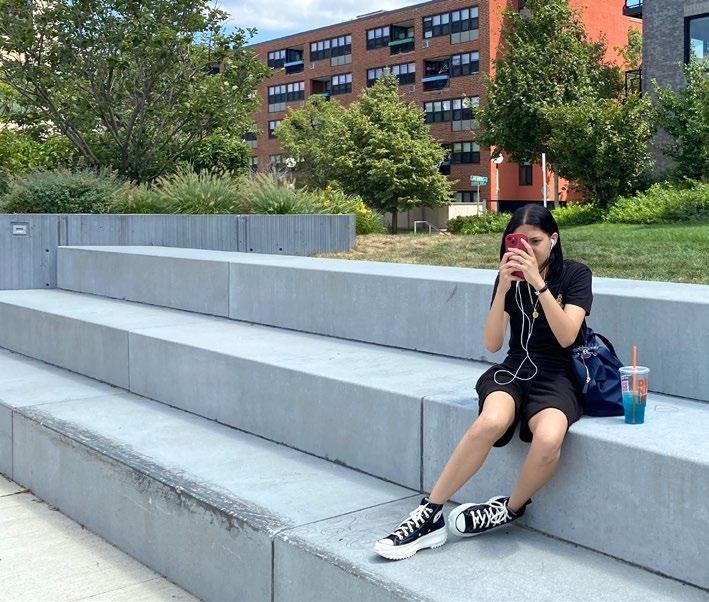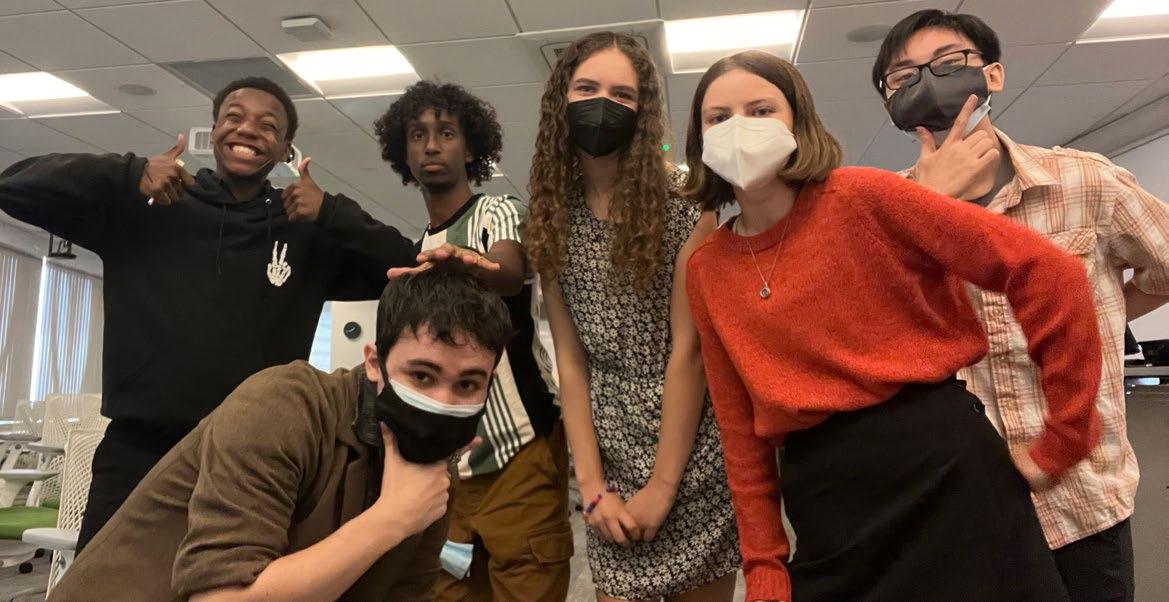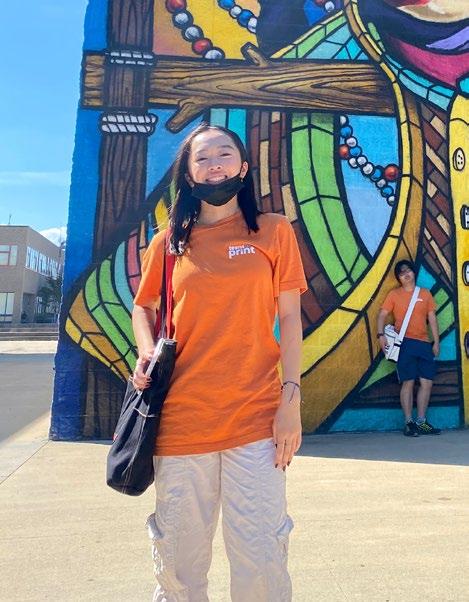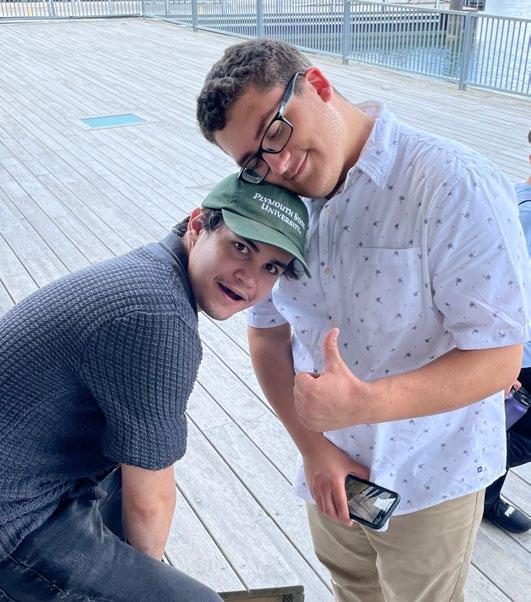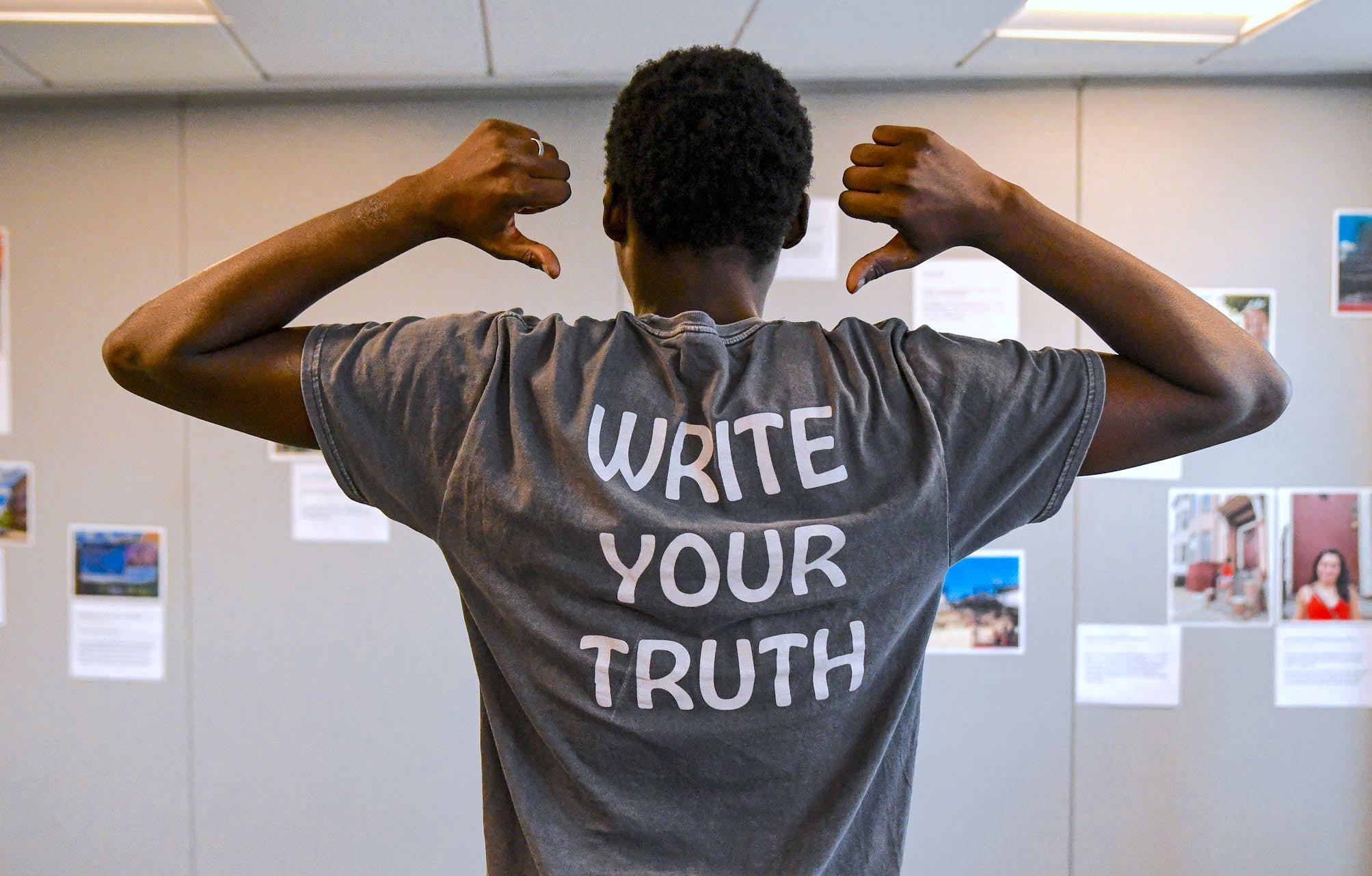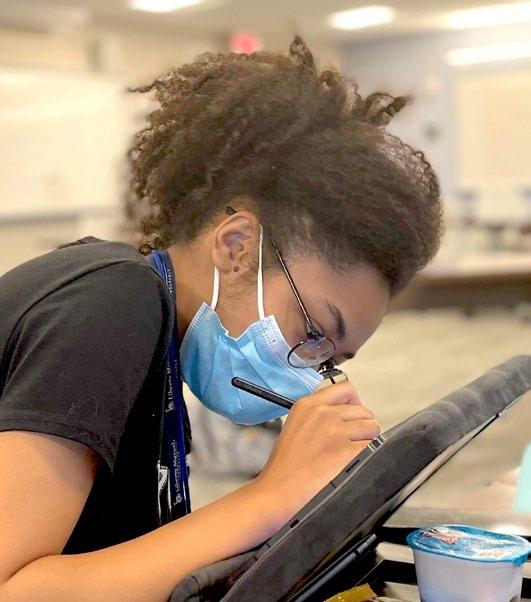
















As their final project, students Aajaya, Michelle, Nuri, Payton, and Shaniece came together to write this holistic review of the 2022 Summer Journalism Institute, or SJI. They interviewed every participant and staff member as well as a number of Teens in Print alumni to craft the following editorial.
teenagers are forced to jump headfirst into the ruthless adult world in order to gain credible experience. By the end of high school we’re expected to have an idea of what career we want to pursue and, imme diately after college, expected to find an actual job. Teenagers are treated like chil dren yet simultaneously held to the same standards as adults. Our voices as younger people are often neglected — going in one ear and out the other. Without opportuni ties to share our work with the world, we begin to lose hope and our dreams seem unattainable. The Summer Journalism Insti tute (SJI) works to combat this by granting Boston youth a platform to express their ideas and exposing us to the limitless world of writing, giving teens an outlet to create freely, explore and embrace their identi ties, and, most importantly, be themselves.
Have you heard of a teen journalist? SJI strives to offer Boston teens a space to share their experiences and opinions through writing. It grants them the oppor tunity to discover their voices and encour ages self-expression. The first three weeks we focused on mini-prompts, personal essays, and op-eds. Personal essays allow you to understand yourself better, looking introspectively. Op-eds show you the bigger picture, seeing the reality of things in a brighter form. This program gives us a mirror through which we start to see parts of ourselves that are usually hidden and eventually look outwards at the world around us. After a week of workshops on podcasting, radio, videography, and pho
tography, during which we were exposed to people in the field — not just journalists but all people who create, from storytellers to filmmakers — we were free to go down whichever path we decided. Each week we got the opportunity to look outwards by traveling around Boston and learn more about our environment, exploring the effects of gentrification and the lesser known history of the city. Graham Mar tin-Wilson, a current TiPster, reflects, “[W]e were talking to residents, we were talking to construction workers, we were talking to all kinds of people. And I really felt like that helped me to connect to Boston; this is a side of the city that I have literally never seen before and it’s crazy to be able to connect to these people that are so different, because we’re all Bostonians. We all live here, the same things affect us.” Through our community outings and reflections, we’ve been able to educate ourselves on the present, dive deeper into issues that we are passionate about, and plan for the wellbeing of the future.
Through the platforms that SJI provides, including its website, social media, and journal, writers are free to express their opinions. As long as the writers follow
This program gives us a mirror through which we start to see parts of ourselves that are usually hidden and eventually look outwards at the world around us.
journalistic ethics, there is no limitation to what they can write, just like real journalists. Elvis Alvarado, SJI Youth Program Facilitator, says, “I do believe in amplifying youth voices, and I think that [youth] have a lot of things to say, and, oftentimes, society deems that there’ll be a prerequisite age to label something as valid.” At SJI, teens can expand and make a name for themselves regardless of age. SJI opens so many doors that would normally be closed to youth. This program is incredibly diverse and welcomes anyone who is willing to try. SJI is not about cranking out an essay just for it to pile with other students’ work in the dust. SJI is about how you express your ideas and how you develop your voice while writing. Clare Ablett, a current TiPster, says, “It’s been really cool to be like, hey, my work is gonna get actually published…at school…you’re writing a personal narrative, and then it disappears. But here I wrote a per sonal narrative and actually people besides my teacher are gonna get to read it, and that’s pretty cool.” SJI not only grants us the space to write in our own voices, but it also makes the writers feel respected. Despite the writers all being teenagers, the staff did not treat us as such and gave us the respect that we needed for independence. Thinking back to his time here at SJI, Kenneth Bufford, a former TiPster, says, “I cannot stress enough how important it was for us. They bought us business cards. They took us as young journalists and made us really into young professionals…I’m so, so, so, so, so incredibly thankful that’s something that they did for us, because, y’all really made me an adult.”
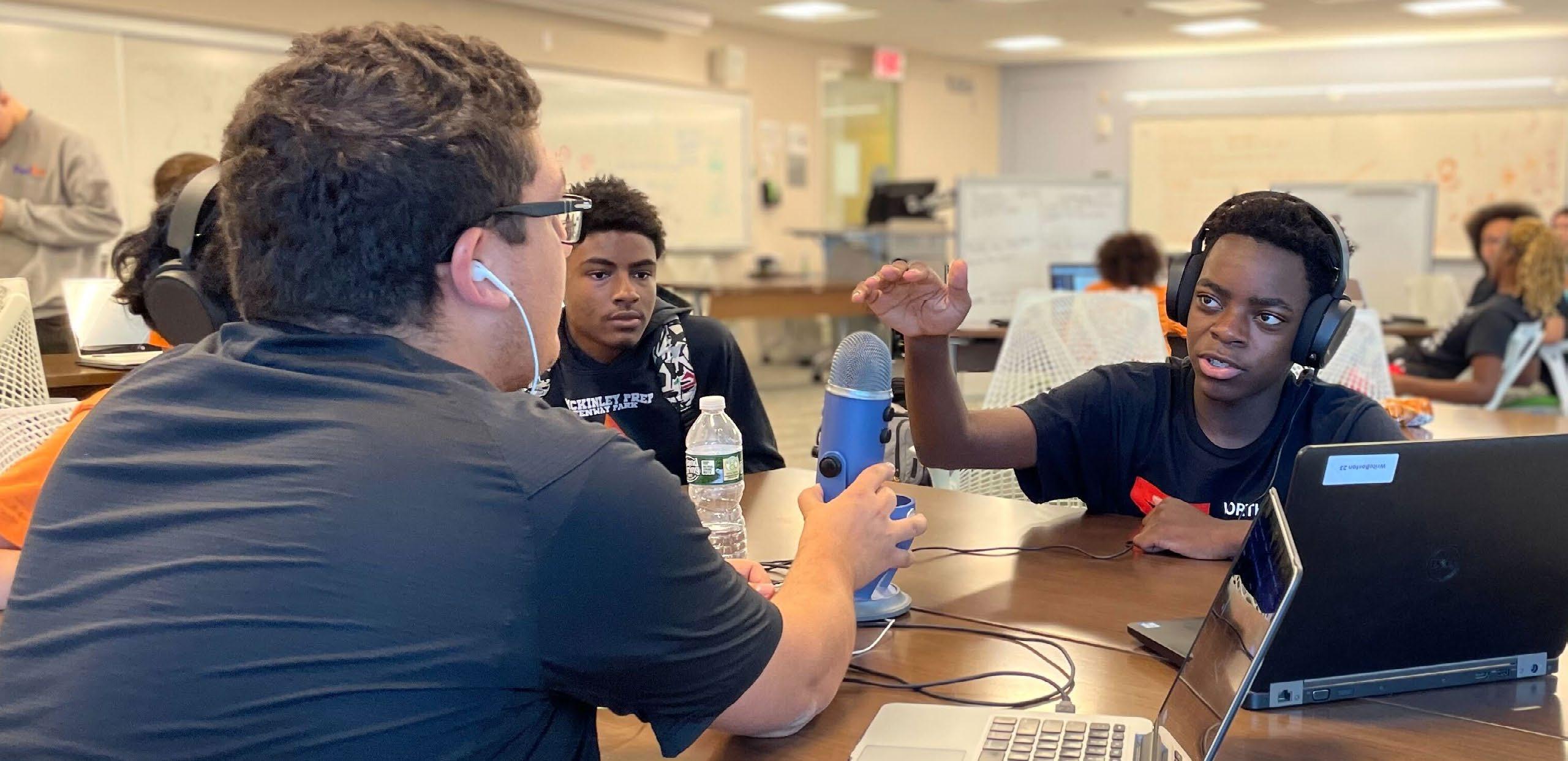
for most people, their writing journey begins and ends in school, which often only covers the basics of writing. SJI understands that though not everyone is born to be a journalist, everyone can learn about jour nalism and express their opinions and feelings through their writing. Even though some of us may not end up pursuing journalism professionally, the skills that we learned at SJI will stay with us forever and be of use elsewhere. Initially, not every student came to SJI from the pure enjoyment of writing. Some, in all honesty, came for the money. Some used to love writing yet lost their interest through the flow of time. A lot of us, how ever, have changed our views on writing. Ablett says, “I think that, before, I kind of associated nonfiction with school and I mostly did fiction for fun. And then at SJI, writing my personal narrative and op-ed made me feel like, oh, I can have fun with this, even if it is nonfiction, and it doesn’t have to be an assignment.” Through cre ative freedom and encouragement, students at SJI can learn that any kind of writing can be fun and exciting.
At SJI we figure out how to incorporate personal inter ests into our work. Youth are still learning to adapt to life, and it’s challenging. When the pandemic hit, it caused so many people to shut out the outside world. Teens weren’t given the opportunity to fully explore and become aware of who they are. At SJI, students are encouraged to be themselves and grow in an envi ronment where it is acceptable and encouraged to use self-expression to create something worth showing the
rest of the world. Self-expression is how we embrace ourselves, whether it is our positive traits or our darkest traits. Jacob Downey, SJI Youth Leader, says “[Y]ou have all of these students coming from different parts of the city, different backgrounds, dif ferent interests, different cliques and niche interests and whatnot. But we’re all united in the fact that we are here to write, we’re here to celebrate those differences. We’re there to have a good time.”
Youth writers are not the only ones here for the excitement of writing — the staff are also here to seek journalistic inspiration. Safi Farah, SJI Youth Program Facilitator says, “[As] a writer myself, I’m constantly evolving...[G]etting in touch with writing and reading other people’s writing is always probably a pinnacle point for a lot of writers and readers, so me being able to consume other people’s content, me being able to get inspired by that content has changed my writing process.” Despite being staff for quite a while, Farah’s interest in writing has not only been stoked by seeing new writers coming in, she continues to learn through reading unfamiliar and one-of-a-kind pieces. The space that SJI creates allows its writers and staff to interact, inspire, and learn from and with each other. Writers strengthen their writing through the sugges tions and comments made by the staff and staff remain impressed by young writers’ creativity.
over these six weeks, we've all gotten to know each other. Through the genuineness of staff and students alike, we have formed an irreplaceable bond. Since the beginning of the program, Mohamed Barrie, SJI Program Director, has constantly warned us of his unique ice breakers, designed to make the participants feel awk ward. We have to admit, breaking the ice was difficult at first, but through mutual understanding and openness to vulnerability, we gradually formed the foundation of a strong community. Alani Hoilett, a current TiPster, says “[The staff] gave an opportunity to us to actually bond instead of trying to direct it,” which effortlessly cre ated a positive environment. From barely participating in group discussions to advocating on issues we have seen in our communities, from spending as much free time on our phones as possible to having lasting chats outside of work, we’ve accepted each other for our dif ferent quirks that make us our authentic selves.
At SJI, our writing allows us to see what actually mat ters. Shaniece Clarke, a current TiPster, says, “I think I have most importantly learned how to be myself… it’s big because I’ve always made jokes about myself as a defense mechanism…and I feel like being able to

express my side [of the story] or being able to tell, and speak about, or write about all the experiences that I’ve always kept to myself is relieving…and I feel like SJI has helped me to do that, because honestly, I really wasn’t able to.” Throughout our time here, we have all undeniably been encouraged to step outside of our comfort zones, whether it be in our writing or socially. With everyone being so open to humility, we were able to create a safe space where everyone is valued and validated. Eventually our bonds formed a comfortable uncomfortableness where we push ourselves past our limits but never past our boundaries — it’s an uncomfort able push that we can pride ourselves in. Angie Lucille Medina Peña, a current TiPster, adds, “In this program
I kind of started being more social. If I don’t like some thing, I speak up about it…I learned how to control my anger here and how to express myself in better ways.” We’ve been given a space to be who we are and to learn from each other. We’ve laughed together and worked hard together, grown through our ups and downs, and we may even miss each other :’)
In order to survive our teenage years, we have to deal with academic pressures and the inscrutability of the future while simultaneously bearing the growing pains of not knowing who we are. Our minds go blank when we’re asked “Who are you?” SJI offers an escape from this internal battle — a pos itive and honest environment hoping for our victory. Finding a space where you can be open helps you to understand yourself more. We no longer are the side kicks but the main characters in our own story. Seeing ourselves as the main character encourages us to put ourselves first and start listening to our wants and needs, without considering other people’s negative input. SJI and writing in general gives us an opportu nity to be the bluntest version of ourselves — no filter. Through our words we can escape the chaos of the outside world and enter a safe haven that we have the power to create but we can also write our truth. Bufford concludes, “Keep putting that pen to that effing paper and write the future that you want to see.” ■
SJI and writing in general gives us an opportunity to be the bluntest version of ourselves — no filter.
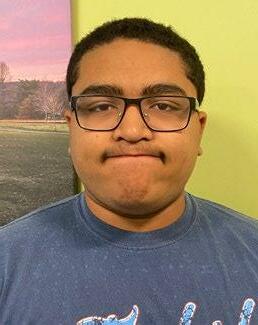
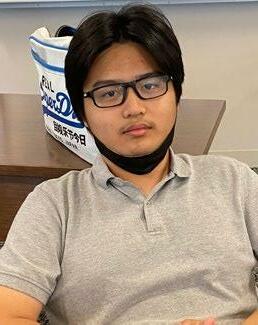
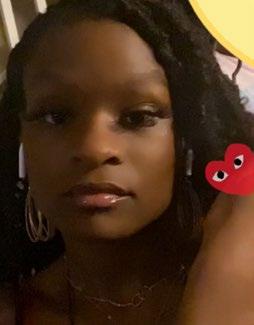

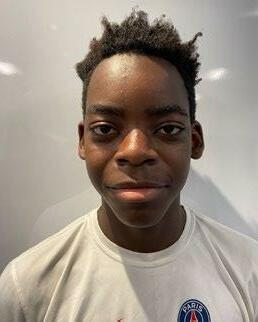
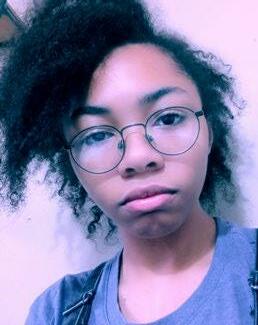

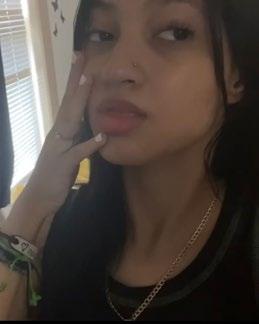



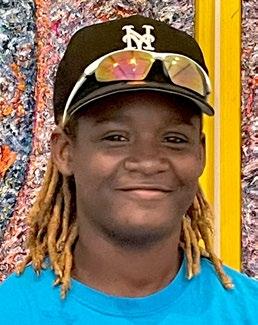

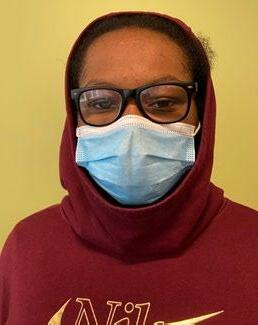

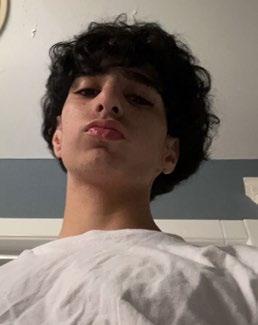

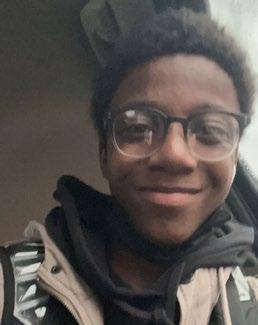
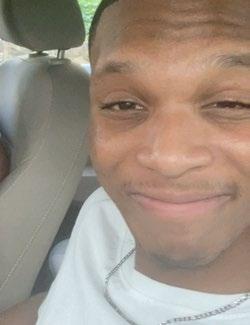
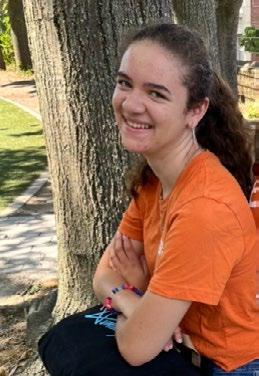
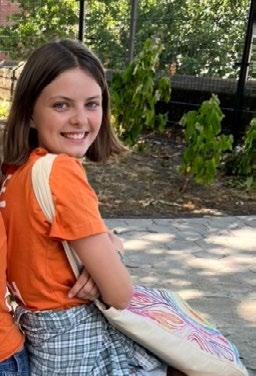
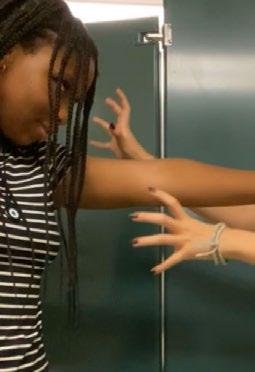


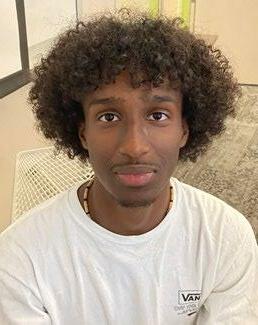

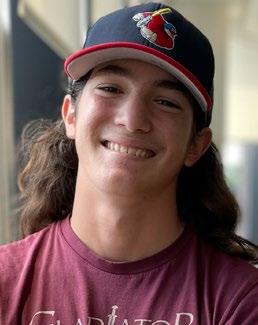
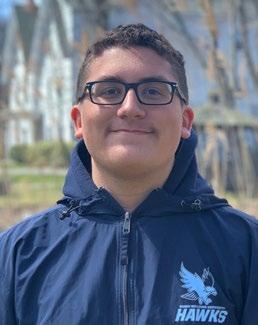

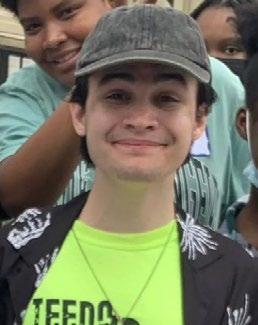
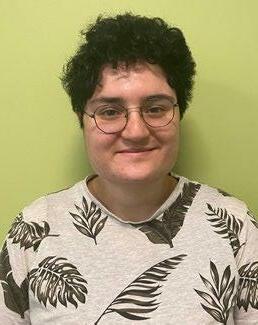
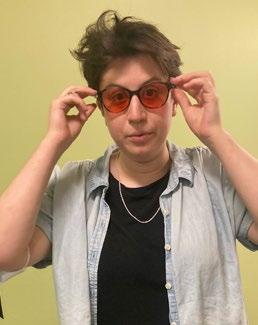

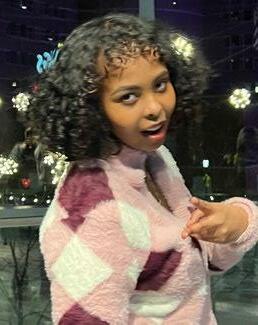

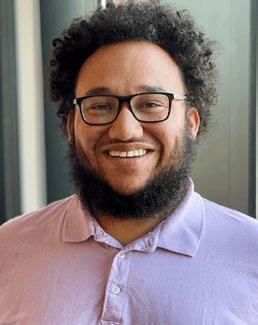
when i was younger I always knew that I wanted to do something in politics. I wanted to be engaged. If I ever saw a shooting star, I would wish to be able to make a change. I would turn on the news and be immediately heartbroken. I saw no one like myself. No one with who I could see myself. I only saw so many old people. It left me thinking, would I ever be able to make these changes? Would I have to wait 5 decades to finally accomplish my dream? People always say “Children are the future.” So I ask myself, “If we are the future, why aren’t we allowed to be engaged in decisions being made?” Youth are needed in politics.
There’s a key difference between the older generation. It doesn’t revolve around the age or the experiences that they share. It goes on a deeper level. In the article “Difference Between Old Generation and Young Gener ation Lifestyle,” the author says, “There is a generation gap between the old and young genera tions because of the different cultures, religions or edu cational backgrounds that they had. The older people were born in an era where there was no technology, so their lifestyle is very traditional and conservative when compared to today’s youth who are always in contact with modern devices such as smartphones, computers, etc.” Since the older generation grew up in a time where it was not as accepting or diverse in a sense it affects what they are capable of doing. In this generation, there are so many diverse people, so many different cultures that have been mixed. Our needs will inevitably be dif ferent from those of the older generation.
Image courtesy of Colin Lloyd on Unsplash.
other young people, the best way to improve this newer generation would be through politics, which is a tool used to take action for development.” We see here that the youth share the same perspective. It allows leaders to understand the real problems and what to prioritize. The article continues by saying, “In countries of dicta torship, the younger generation’s fresh ideas and new leadership can help to overcome authoritarian prac tices. Protests led by youth leaders can force autocratic leaders to step down from power, allowing these youths to become part of formal decision-making.”
We live through collective experiences since we grew up together in this generation. There are a lot of pros to this generation being involved in politics. Youth are creative, they make a difference and most importantly we want a change. Following this, in the article “Global young voices,” the author, Christina Boutros states, “The youth face many issues in the world, but these issues go unheard. Since the youth would better understand
This is so important. In politics, we’ve seen so many leaders who weren’t remotely young compared to the newer generation. With polls we see that “The average age of Members of the House at the beginning of the 116th Congress was 57.6 years; of Senators, 62.9 years.” Now when this is compared to the average age of voters, “Our calculations, based on votes counted as of November 18, suggest that 52%-55% of voting-eli gible young people, ages 18-29”. As time goes by more young people get engaged. The idea of being in politics

and making a change won’t be associated with age. It will be associated with the people who have the ideas and the right perspective to improve our future.
I think Simply starting more student councils that work hand-in-hand with government officials. Here students would gather from all around and voice their concerns. According to the article Elevating Student Voice in Edu cation, “On the one hand, adults gather and use stu dent perspectives, feedback, and opinions to inform change. On the other hand, students participate in deci sion-making bodies that drive change. Student agency increases as students assume more leadership and have greater responsibility and accountability in instruc tion or policy changes.” Doing this would make more youth voices heard. After that, we could work our way into younger people voting and modernizing the way it is gone about. There could be different occasions where we could inform the youth about current issues for everyone to work together. Eventually, we could create something bigger. We would allow younger people to be a part of the legislative process.
Recently, the Supreme Court decided to overturn Roe v. Wade. This decision abolished the right the consti tutional right to an abortion. In simpler terms, women no longer have the choice to do what they want with their bodies. When looking at the people who made this decision we see older, more conservative, and tradi tional people. Due to the decision to overturn the case we see that an estimate of 10,000 people gathered to protest on this issue. This generation cares about issues such as the climate crisis, gun violence, racism, women’s rights and so much more. Instead of focusing on these important issues, we see that Congress is pri oritizing the military. No matter what, we aren’t being heard and with a leader in the younger generation we would be heard.

To have the experience you have to have a beginning. So, therefore, allowing young people to be involved will then give them that experience you claim they lack, but the experience isn’t the only important thing. Future leaders will need lots of different skills; They need to possess leadership qualities, have new ideas, and con nect with the people they are trying to lead. Since the younger generation is the future, they are entitled to make decisions since we will be around to live through the consequences. ■
Hi, I’m Shaniece and I recently moved from Jamaica. I decided to make the change to move to Boston when I was 13 years old. Now I’m a rising sophomore at Fenway High School. I’ve loved writing and expressing myself through words. I can’t wait to see what the future brings.

in every human life, they will eventually get injured or hurt. May you be a child at the time or a full-grown adult, you still require medical assistance. Thus doctors and nurses became a necessity and held much pres tige. Despite this, there is a group of nurses who do not hold the same prestige while helping hundreds of chil dren each year: school nurses. Have ever heard, “I want to become a school nurse,” come out of a child’s mouth? Do you see advertisements encouraging respect for school nurses? Do you know your school nurse’s name? Does your school even have a nurse? Did you know that there’s a global nursing crisis? That nurses are few and far in between.
These people are unsung heroes of the public school system in America. School nurses are just as important as teachers in public schools because they are left responsible for taking care of the health and safety of the public school students while teachers focus on their classes. While many people are focusing on the teacher shortage in the US, the school nurse shortage grows. A
report published and sponsored by the National Center of Education Statistics (NCES) looks into the number of school nurses in American public schools. According to the NCES, during the 2015-16 school year, slightly more than half (52 percent) of public schools had a full-time nurse. Including part-time nurses, more than three-quarters (82%) had at least one full-time or parttime nurse. This means 18 percent of public schools lack a school nurse while 30 percent of schools share parttime school nurses. This shortage of nurses can cause a variety of problems for students,parents, and teachers alike. The school nurse shortage leaves teachers unprepared to deal with injuries while parents struggle to find proper care for their children. School nurses are a necessity in public schools where thousands of U.S. children spend seven hours each day. Teachers in public schools already have so much responsibility and can’t be expected to deal with student illness or injury. The fact that there is a lack of school nurses brings light to the lack of government intervention when it comes to student safety.
The lack of school nurses can be explained by the lack of federal legislation because there is no federal law saying that school nurses are required per school. The idea that schools can go without nurses is igno rant at best and life-threatening at worst. In 2014, a sixth grader at Bryant Elementary School died from an asthma attack after falling sick while no nurse was on duty. This incident happened in a public school in Phila delphia and caused an outcry against the budget cuts. The shortage also leaves school nurses overworked as they try to cover multiple schools. This increases the possibility of students going without receiving treat ment. This unacceptable circumstance is made worse because students will end up punished or wrongfully marked absent if they fail to show up out of fear for their safety. An article by the Healthy School Campaign (HSC) states “To understand how to reduce chronic absen teeism, an understanding of the reasons behind missed school days is key. One of the main reasons students miss school is due to both chronic and acute health conditions.” Chronic absenteeism mostly affects the students for they fail to pass when they feel they can’t come in because of their health issues. HSC believes understanding is the first step to the solution to fighting chronic absenteeism and providing solutions for those health-related causes. These solutions require knowl edge and skill the average teacher does not have. With the added information from Safehome, a home security company that compiled and organized data from the NEISS, we see the possibility of school injury is more common than you might think. Safehome found that over the past decade, more than 175,000 school injuries have resulted in a visit to a hospital emergency depart ment. Though Safehome also pointed out that injuries sustained at school had been on the decline between
2017 and 2019, this does not excuse the fact children are still getting injured at school. Children get hurt a lot and teachers can’t watch every student every second of the school day. Simply having a nurse on sight can save or prevent an injury from worsening so why are school children left without this important figure?
The terrifying part of this is that no one is speaking about this here in the US. Teachers, students, and nurses are left to suffer as mainstream media fails to cover this issue. Covid 19 adds to the issue as nurses are left to pick up the pace to protect students’ health while having to deal with parents. In an article by NPR, we can see school nurses share their grievances in 2022 about dealing with Covid 19. One nurse states, “Our school nurses are exhausted,” Gavin says. “I think last year I had said school nurses felt like the weight of the pandemic was on their shoulders. We’re on our knees now, with the weight of the pandemic on our shoulders.” These underappreciated nurses are left to their own devices as Covid 19 fits of rage on while their voices fall on deaf ears. The lack of information on this subject affects this op-ed and my ability to shed light on this issue.
If this issue is not taken seriously we may end up in a scenario like Ontario, Canada. On August 30, 2021, the CBC posted an article going over how parents who have medically fragile children are left to suffer with no option of remote learning. These children will end up behind in their education to protect their health because of the school nurse shortage.
School nurses should be required by federal law. The budget cuts to public schools don’t only affect teachers but nurses’ ability to treat students. A school nurse does not only provide the peace of mind of knowing you or your child is safe but respect for students. Stu dents throughout the USA are being left to their own devices as they are left injured and disrespected. Stu dents need a person they can rely on in these med ical emergencies where their parents are not there. If you are someone who is studying nursing perhaps look into a school nurse position. It is up to both parents and students to fight for awareness on this issue, and talk to people about bringing attention to school nurses and the respect they deserve. In a few states, people are voting for legislation to be passed to ensure their schools have nurses; if you live in one of those states please vote. ■
Hello, I’m Celiamarie Gilmore. I’m a 17 year old artist who likes writing about pop culture and art. I also won’t stray away serious topics but I’ll focus on more lighthearted things instead.

“there is my room, on the right,” he said. I eagerly opened the door, curious what I would find. As I turned to look, my heart dropped to my stomach and I audibly choked out a breath. On the wall was a poster of planes from various places. I couldn’t take my eyes off the planes with little swastikas on their sides. I asked which one was his favorite and he pointed to a sleek gray plane with an American flag on the side. With many frantic thoughts bouncing around my mind, I walked down the stairs with someone who for all I knew, was a Nazi.
The swastika is a symbol that Nazis rallied behind in the early to mid 1900’s while killing approximately 6 mil lion Jews and 5 million war prisoners. It decimated the number of Jews in the world and the horrific incident lives on in the hearts of many.
Due to its presence in Trojan artifacts, the swastika made its way through Germany in the 1910’s with a wave of nationalism and Aryan supremacy. The Aryan were an alleged “superior” race of which Germans were direct inheritors and from which Jews and other “infe rior” races were excluded.
I have family who were in concentration camps in the Holocaust and I learned about it at a young age. I grew
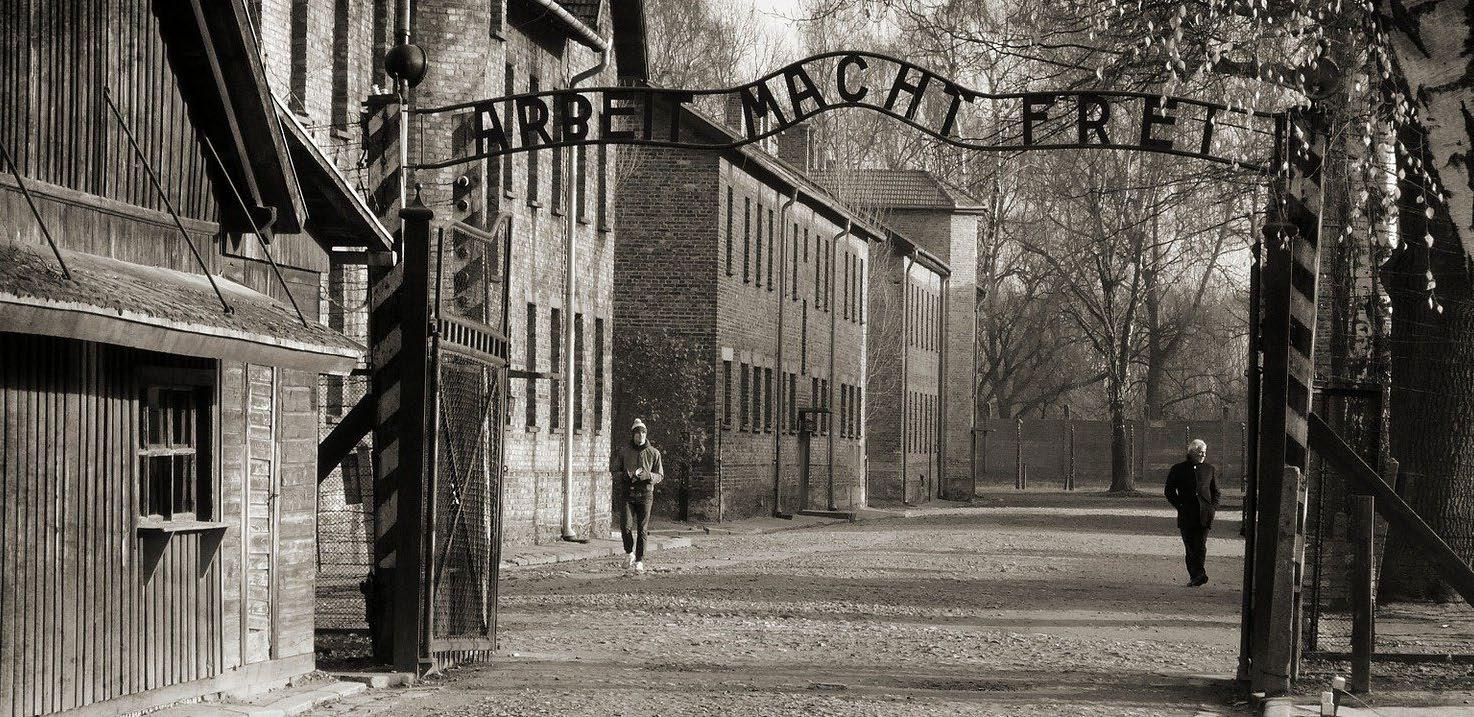
up calling the grandmother of a family friend on Skype and learning about her experience. Their traumatic experiences stuck with me and I grew up trying to edu cate people so they understood this painful history.
The swastika reminds many Jews, including me, of the horrible genocide and the people who carried it out. I left the house that night with a deep feeling of worry. I had been reminded so often that anti-semitism was still very present in our world.
Swastika tagging — recreating the symbol in public — is on the rise in the US. According to USA Today, “the Anti defamation league no longer automatically classifies a swastika tagging as an anti-semitic incident,” classi fying it instead as a general hate symbol. But as peo ple’s knowledge of its origins fades, the sting of seeing it as a Jew anywhere does not. The ADL reported a 34% increase in antisemitic crimes in 2016 and saw a spike at the start of 2017. Hitler is long gone and many of us would love to believe that anti-semitism is not a threat anymore, but it is wrong to turn a blind eye to the fact that his message and anti-semitic beliefs are still present.
I later learned my friend wasn’t a Nazi and the display of the swastikas came from the pride of having uncles who
fought against the Nazi regime and a profound curiosity about history.
The podcast “This American Life” portrays a similar situation with a hate symbol. A couple looking for a new home walks into the house of a police officer. They start their tour and soon after they see a KKK application framed on the wall. Describing his reaction the hus band says, “[A]h, hell no…this is a Klansman house. We’re leaving right now.” The family later found out this officer was not part of the KKK but was only interested in the history. This story is similar to mine and it poses the question: does the intent behind the object matter or do these things speak for themselves? I think this family would agree with me that it doesn’t matter what purpose or curiosity these images fulfill. These are symbols of hate and the message behind them will not and cannot change.
This isn’t to say that the swastika must be banned in every context. The manji, a symbol used in religious iconography in Japan and elsewhere, is a backwards swastika. In preparation for the 2020 Olympics in Tokyo, maps which marked temples with a manji were changed because of their likeness to the swastika. This is what others should do. There is no reason to stop using the manji as it is an important part of people’s reli gion; it is also important, though, to be conscious of its impact on people.
Mapmakers in Japan understood better than my friend when they changed the manji as a map marker to a three-story pagoda. Though Americans are assumed to be the ones offended by the display of swastikas, it’s clear to me that too many people in this country don’t understand the gravity this symbol carries. We need to educate ourselves on the history of not only the swastika, but symbols associated with the KKK and other hate groups so nobody has to go through what I and many others have. I hope my friend can join me in understanding these experiences without discounting the trauma of this history. No matter how differently others see the swastika or manji, it doesn’t change or lessen the impact of the genocide that was carried out with the symbol as Hitler’s right hand man. ■
Nuri is a 14-year-old freshman at Boston Latin Academy. He enjoys free writing and writing op-eds. He loves learning about history, playing baseball, and hanging out with friends and family. He wants to become an author or professional baseball player.

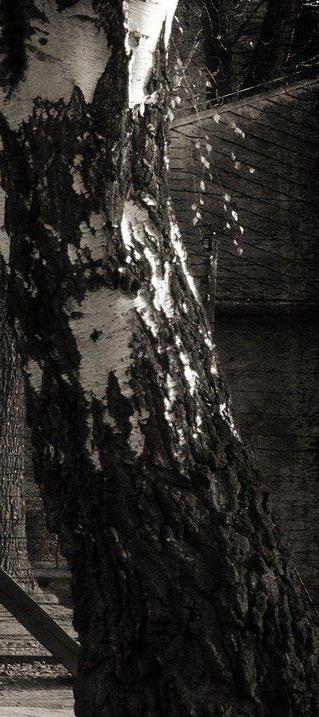
i walk slowly along the sidewalk knowing that I am almost there. My hopes go up, but right back down after seeing the sea of cars, I have to cross. I feel sweat trick ling down my neck as the colored tons of metal move to their destination at lightning speed. Is it any wonder that people are nervous about crossing a street filled with these death machines? Somehow I managed to get across and made it to safety. Though the experi ence got me thinking about why streets are not made for pedestrians. Could we potentially live without cars?
The number of cars should be limited to give the streets back to the people. Before people had cars, people were traveling by carriage, walking, ships, or horse, but those ways of transportation often took a lot of time. Cars gave back the time people would often spend trav eling and made it easier for people to get around. More over, Cars revolutionized the way cities and towns were built because now in the 21st century you can see that the streets are made for cars and not for the people. No matter how helpful cars are, they have many down sides. Even though cars have made many safety advancements like seat belts, airbags, and crumple zones, The National Highway Traffic Safety Administra tion projects that “an estimated 42,915 people died in motor vehicle traffic crashes last year,”(NHTSA). Even with the significant safety changes, large numbers of people are still dying in car accidents. A benefit of lim iting cars is that it could save so many lives because if there is a limit, then fewer car accidents can happen since there are fewer cars on the road.
Cars are contributing to climate change by releasing greenhouse gasses that get trapped in the atmosphere, heating the earth up. Not only does climate destroy the habitats of animals such as polar bears in the arctic, but it also causes extreme weather like hurricanes, wild fires, and floods that could potentially kill you. Humans have caused irreversible damage to our only planet by burning oil and gas. The EPA (Environmental Protection Agency) highlights that “Greenhouse gas (GHG) emis
sions from transportation account for about 27 percent of total U.S. greenhouse gas emissions, making it the largest contributor of U.S. GHG emissions”. Corpora tions that own large transportations like cruises are also part of the problem with the fuel inefficiency that causes more CO2 emission. To have a limited amount of cars on the streets is a collaborative effort that needs to be taken by everyone including corporations.
I know that most people might be thinking of how a carfree future is impossible because cars are used to get us everywhere we need to go. Potentially, if we limit cars, then we will limit the mobility of people. I disagree because Oslo, the capital of Norway, has achieved the reality of a car-free zone, so why can’t other places do the same?
Oslo is just like any other capital, which has bustling streets filled with people who need to get to places;
however, Oslo prioritized the people over cars, so they made Vision Zero, which is a place where you don’t have to depend on cars.
Oslo had bold plans to make vision zero a reality, including according to Elvaas, who is a former Communications Adviser for the Oslo Car-free Livability Program, “ the removal of 760 on-street parking places, a new driving pattern to prevent through-traffic, reallo cating of car-free areas for new uses to increase city life.”(Elvaas) Oslo had made that happen and currently, the capital is a car-free area that prioritizes the people and makes transportation easier and less traffic. Not only have lives been saved, but Oslo is also a happy, healthy, and attractive city. Moreover, according to Advocacy Advance, an organi zation dedicated to bike and walk advance ments, Oslo had reported 41 traffic fatalities, but by 2019 only 1 death was reported. So that shows Vision Zero works and can save lives.
One way we can bring Oslo to the US would be to invest more in public transportation, and bike safety. If people have more of a variety of transportation then they will not have to depend on a car as much.
Some might say that cars are very useful, so limiting them would be a very bad choice. Cars have many advantages like freedom, time-saving, privacy, and travel, and are useful in emergencies. The disadvantages outweigh the minimal advantages. Limiting cars on the road can make travel even better with the risk of dying in a car crash. Every argument that people have in favor of cars is about the individual and not about the whole group. Limiting cars would be for the greater good.
We as individuals in a car-abundant society deserve to have the utmost safety when walking by making the streets for people and not machines. We shouldn’t need to depend on a death machine to get everywhere we need to go. ■

Ketura is a 14 year old girl that lives in Massachusetts and is just advancing to the unfamiliar territory of being a freshman. She’s a passionate young lady that has many passions like writing, robotics, and many others. Ketura is very unsure of what she would like to do for the rest of her life, but she knows what she would like to do now.

Hi! My name is Graham Martin-Wilson. I’m a reporter for Teens In Print. I’m an avid writer and interested in the fields of Journalism and Social Science.

recently, with the overturning of Roe v. Wade’s constitutional impact and the looming threat of many more reversals of decisions widely hailed as crucial civil rights cases (including those that enshrine and protect the rights to contraception, same-sex marriage, and even interracial marraige), Americans are rightly wor ried about the future of our country and its democratic ideals.
Distrust in many of our institutions is at an alltime high. In a 2000 poll, 63% of Americans sampled said they had middling to no confi dence in the Supreme Court; a figure that has swelled massively in the modern day, with a 2020 poll showing that 75% of Americans have very little confidence in the Court. The future, however, is not the only thing to be concerned about. At present, Con gressional institutions designed to enforce the rule of the minority work to unravel the progress of the last century, and the Judiciary sits poisoned by rampant and unconstitutional politicization. The government’s structure is diseased with the taint of toxic ideology and political ambition, and the time has come to heal the damage.
The point of a democracy is not to get people to agree by necessity, but to bring the will of the majority into effect so that as many people as possible are sated in life, and so that all have their natural and civil rights pro tected through a contract such as ours. A semi-remote government is a necessary sacrifice to the true majority will in a Republican system such as ours for the sake of efficiency. In a democracy where everyone has direct input, things quickly become disordered and overly complicated. A Republic is supposed to solve these problems by offering fair representation to all people while lowering the size of government significantly. However, there is a key difference between necessary sacrifice for the sake of efficiency and a blatantly count er-democratic design.
The Supreme Court and Senate have worked hand-inhand to position the GOP in such a way that it seems very likely the progress borne of many civil rights eras will be wiped from the scoreboard.
A governmental institution that is designed to objec tively identify the legitimacy of laws clearly should not be blatantly politicized, with Justices labeled under party leanings. Yet this is exactly what has occurred with the Court in the last few decades. The Court has been warped from its original purpose as an impar tial tool to administrate and review the law, and trans formed into a political tool used for the advancement of Political and Ideological Agendas which should have little place in our society. And without the political balances of the other branches, as most Americans have no direct say on who gets appointed to the Supreme Court, this is a frightening new addition to the government.
Even if the Democrats held a majority on the Court — even if all nine Justices were Demo crats — I would still be writing this article in the same vein, though prob ably with different exemplary cases. The Supreme Court itself is outlined by the Constitution, and by consecutive legislative acts, as an Impartial Governmental Check — not just another Wing of Government. By treating it as such, we are undermining our society’s greatest strength – that of the people.
The government’s structure is diseased with the taint of toxic ideology and political ambition, and the time has come to heal the damage.
Alongside this, the Senate is highly under-representative; due to the even splitting of senators across states, those who live in (largely Republican) smaller states have more control over the senate per person than those in (largely Dem ocratic) larger states. This design, while ostensibly to balance out the power of the House of Representa tives, has never done such; indeed, the House’s initiatives for new laws are often thwarted by a minority of the minority chamber. The Sen ate’s own procedures are designed to allow a minority party to cling to their positions of power. Both cham bers of Congress, and especially the Senate, are widely recognized as the most unpopular branch of government; the GOP has not repre sented a majority in Congress since 1996, and yet continues to strangle nearly all efforts by Left-leaning congress members to create laws. A branch that flaunts its indepen dence from the will of the people in the face of democracy cannot be allowed to stand without repair. As for the Filibuster, and the originalist viewpoint, the Framers did not even want political parties in government (rightly thinking they would cripple a democracy); to say that much that goes on in our government to this day aligns with the thinking of the Founders is highly doubtful, not least because they lived nearly two hundred and fifty years ago.
It’s not too late to fix things. If the Court is brought to an impartial state by necessary action, and the Senate removes its restrictive pro cedures and allows for the course of democracy to flow, the monumental progress made from the move ments of the last centuries may not be erased. No one who supports a truly fair state should have anything to fear from this proposal; after all, a level playing field is a great and his toric American ideal. ■
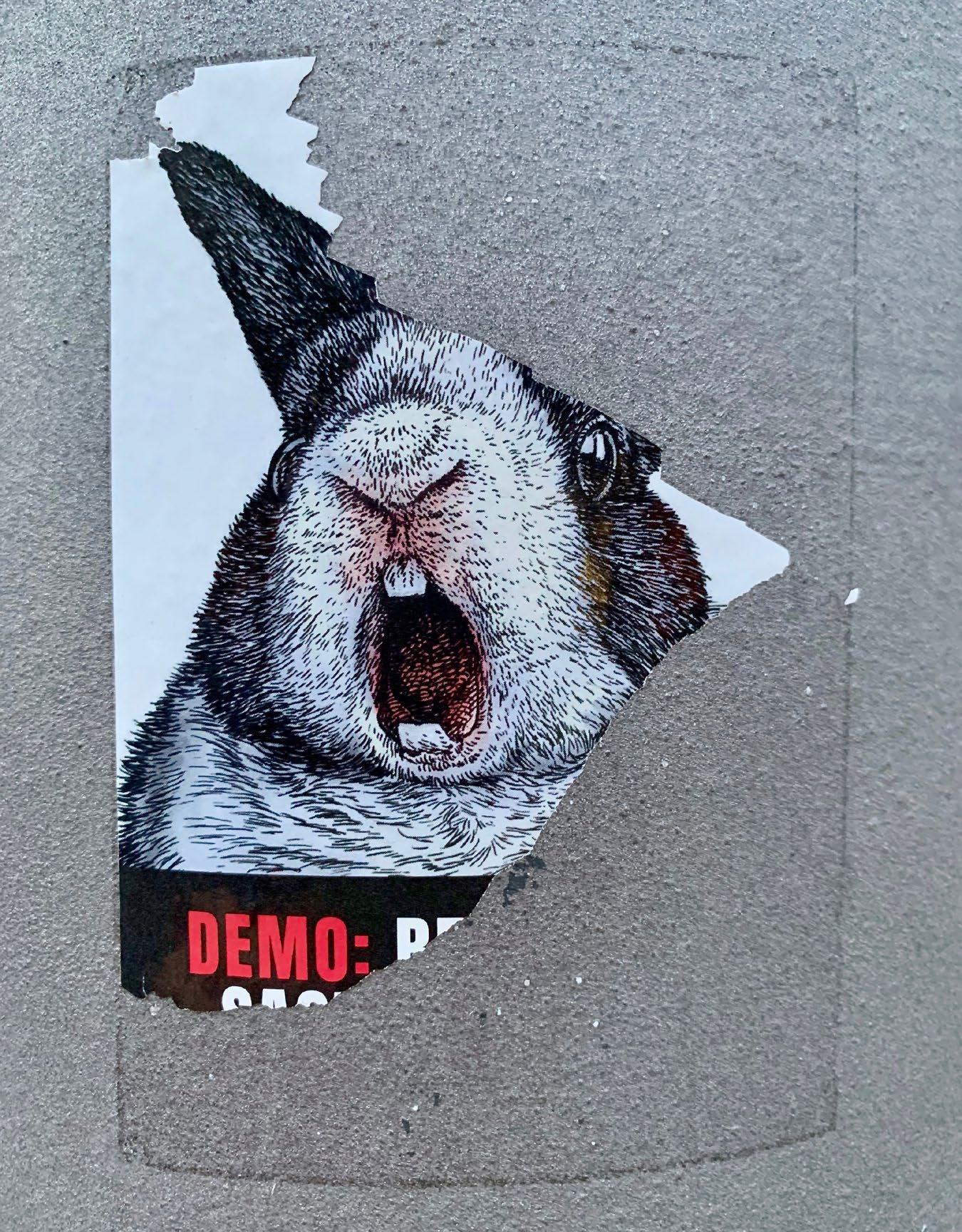 by angie medina pe Ñ a
by angie medina pe Ñ a
imagine waking up every day to bright lights and people wearing rubber gloves, white coats, and masks. They hold you tight and insert a skinny tube up your nostrils that contain weird chemicals. After this, they put you in a cage for the rest of the day until you have some type of reaction and they do tests on you. You’re forced to do this your whole entire life, from when you were a baby to the day of your death. You see people
killing animals right after injecting chemicals into them. If you’re a dog you’re forced to breed with other spe cies,, if you’re a rat you get chemicals injected into your body, if you’re a monkey you get your body stretched and used by machines. Nobody is safe in laboratories.
Animal testing is horrible and inhumane and it shouldn’t be a thing. I wonder how people would react if they got taken from their homes and got tested on. These tests are not even relevant since animals react differently from humans when in contact with certain chemicals. Knowing these differences exist and still abusing ani mals is animal cruelty.
In ancient Greece, vivisections of animals were a normal practice to acquire knowledge on the mechanisms and functions of living organisms; they still do these experi ments to this day. In the US there are no laws protecting animals from physical and psychological pain and suf fering once the testing has been approved by the in-house committees.
According to NPR’s science, medicine and environ ment correspondent, Richard Harris, in his article titled “Drugs that work on mice often fail when tried in people,” Harris writes, “rats and humans have been on their own evolutionary paths for tens of millions of years. We’ve developed our own unique features, and so have the rodents.” Rats and humans are different in many ways and will show different results on the same kind of test.
Something that people say to defend the cruelty of animal testing is that animals can’t feel pain and that they don’t feel emotions. This is wrong. Animals can get sick, they can be angry, be sad, be happy, and feel all the emotions we have too. According to Psychology professor and affiliate at the Kennedy Institute of Ethics, John P. Gluck, John writes, “We have consistently under estimated animals’ mental complexity and pain sensi tivity.’’ Humans don’t see animals as individual beings and only see them as tools. They will talk about animal testing but leave out the worst parts of it. Animals are smarter than humans in different ways. I know it sounds stupid but they have survival instincts that humans don’t, they can sense when they’re in danger, and they know when to attack and how to attack. People may say that there is no point in animals being on this planet with us, but they are wrong. Animals have been on this planet for millions of years and nothing can change that.
In his article titled, “Second Thoughts of an Animal Researcher,” John P. Gluck said, “College textbooks are frequently sanitized, stripped of descriptive language, deliberately preventing the reader from getting a true picture of the emotional and physical torment inherent in the research.” Cruelty in animal testing is a real thing, is something that has been going around for many years, and is not spoken about enough. According to The Humane Society Of The United States, animal
testing is illegal in several US states like California, Hawaii, Illinois, Maine, and Maryland.
Animals are being abused by scientists, who don’t want to show you the real cruelty in animal testing. This shouldn’t be normalized in any kind of way. According to Humane Society International, “Some tests use thou sands of animals at a time, while others are repeated two or even three times using different animal species or routes of administration (oral force-feeding, forced inhalation or skin injection); no pain relief is provided.” Makeup brands and other products use animal testing before releasing their prod ucts. Some compa nies that use animal testing include but are not limited to L’Oreal, Colgate-Pal molive, and Henkel. The more people buy things from these companies the more animals get abused and tested on.
It would be nice if people started sup porting companies that are cruelty-free. There are organiza tions like “Last Chance for Animals (LCA)” that advocate for animal rights. LCA is an international, non-profit orga nization dedicated to eliminating animal exploitation through education, investigation, legislation, and media attention. This organization has its roots in fighting and exposing the inherent cruelty of vivisection. Donating to this organization will help stop the pain and suffering inflicted on animals each and every day. We have the power to choose if we want things to change or not. We can donate to organizations that rescue animals from labs and give them a life they would have never had if they were stuck in a lab. We can protest to make things change, we have a voice for a reason and we need to use it for the better. ■
My name is Angie Medina, I am 15 years old. I currently go to the Margarita Muñiz Academy and I’m in the 10th grade. I was born and raised in the Dominican Republic. I want to finish college and become a pet veterinarian. I love reading books that have horror and mystery. I enjoy writing about my past experiences and expressing how I feel.

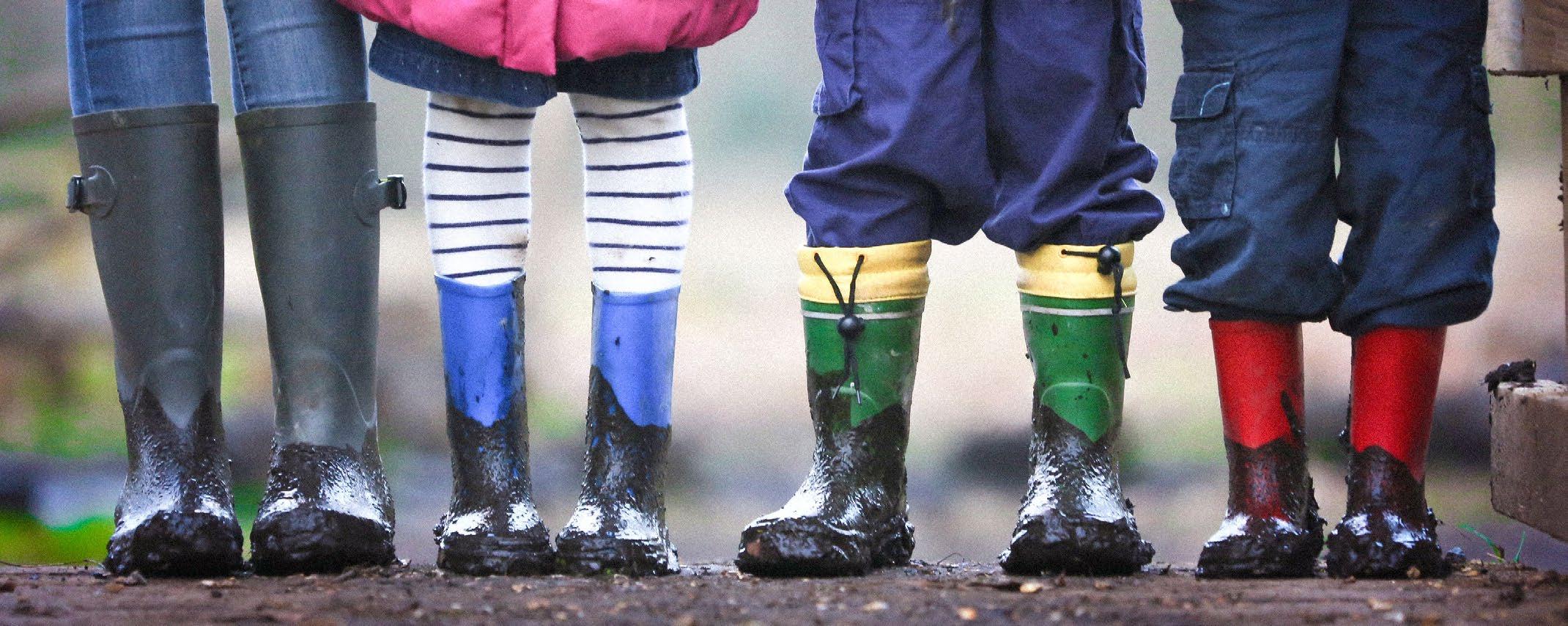
have you ever wondered how a dictatorship works? How do dictators get all that power? When I came to America and enrolled in high school, I was advised to never mention anything remotely close to politics, by teachers and advisors. “Just avoid political talk”. In the land of free speech? Really? I kept wondering why. Obviously not everyone is going to agree with each other, but to not even give students the chance to learn how to be civil was shocking; maybe in some cases it’s best to avoid conflict. But how are we going to be prepared for the real world and all its encoun ters with people who have different opinions and ideas when we won’t have our teachers above our heads to extinguish that fire anymore? If we don’t talk about pol itics in school, how does one even hold power as a citizen? How does one gather enough information to build their own opinion and not get influenced by their family members, the news, or false information online? How are we even going to build the skills we need in order to figure out what our morals and true laws are? Is this “norm” enforced so we all grow up blindfolded and easily controlled? Is this rule implemented just for the comfort of the government? The government is not always looking out for the best interest of the citizens. Young minds need access to resources and knowledge to protect themselves from their grasp.
The students are, of course, not at fault. From the first day of grade school to my last day of senior year, I had engraved this taboo statement in the back of my mind "do not say anything political," I worried a tiny drop of my opinion might slip out of my mouth whenever I heard something I did not like or that scared me. But here I am, a young person who graduated from an Amer ican high school that has learned how to use my voice; this creates a plethora of problems. Now that I have graduated from high school and have gained more consciousness, I real ized how harmful it is to students when teachers and educators refuse to let students engage politically in class. A class is filled with so many people from dif ferent backgrounds; There are students that face polit ical tyranny because of their race, sexuality, religion, gender, etc. It is unfair to not allow students to express what they think about their country’s government in a space where they spend the majority of their days for 12 years. That restriction makes the environment of the class unwelcoming, as if students need to hide these unchangeable parts of their identities throughout their schooling. In the long-run, it also makes them lose their voice, making them more susceptible to following the government.
Allowing the suppression of ideas hinders growth. How could an educator be okay with this? Everything you say and do, kids absorb it all. You have the power and the responsibility to contribute to shaping each student up into a powerful person. A survey conducted by the Southern Poverty Law Center proves that more than half of 10,000 administrators, teachers, counselors, and support staff feel "uncomfortable" bringing up politics in the classroom. That is damaging to young minds. If you are not willing to let students use their voices and learn something from each other just because you want to avoid "conflict". Maybe you are not prepared to work in a school.
The more teachers and schools isolate students by not allowing them to speak up, the less stu dents are going to know how to listen, under stand other people, and not attack them outside of school. It’s in the hands of educators and administrators to mold us into the citizens the world needs. If we are refused a broader way of thinking, the result will be what our society unfortunately consists of now, closed-minded individuals who will believe anything, are only able to think one way, and can’t respect, sup port or understand opinions because they were never taught to. This is how people lose power in society, and how dangerous ideologies are accepted and conformed to.
In an article by Larry Ferlazzo, a long-term edu cator and author, he explains the disadvantages of silencing students in classrooms, "Keeping politics out of the classroom does not prepare students for civic life. Placing limits on conver sational topics that could bubble to the surface at any point tells these citizens that no one is invested in hearing their opinions. That destroys democracy." Meira Levinson, a normative polit ical philosopher, an Oxford graduate, and Har vard professor, writes about this in "No Citizen Left Behind": We have a civic-empowerment gap. Students do not believe that they can influ ence the government, which leads to lower rates of political efficacy. Therefore, students with low efficacy engage with the government less. This gap flows across our country in predictable ways. The reason students grow to believe we can’t influence the government is because we are not given the necessary skills that give us the confidence to try. Years of being muzzled and taught to think a certain way made us unin terested and less caring.
You have built an unguarded generation. A gen eration that never got the chance to expand their way of thinking. A generation that thinks there is no way out of unwanted governing. A generation with no voice.
It’s time to re-teach educators on how to pre pare the next generation of youth to be capable individuals and leaders if we wanna avoid cre ating the world’s next pushovers. ■
I am Eirini and I moved from Greece four years ago. I am a rising freshman at UMASS Boston. My major is Criminology & Criminal Justice.

tryouts were coming up soon and I had to make sure I was ready to ball. I was in history thinking about every shot, move, or trick in basketball as I watched the clock slowing tick and tock. The last bell finally rang and I ran out of the classroom. Walking through the hall, teachers were telling me I’d be okay. Those calmed some of my nerves but the rest of the jitters grasped on for dear life. I saw all these girls shooting the lights out the gym in awe. Since there were good players, I had to show out to make the team.
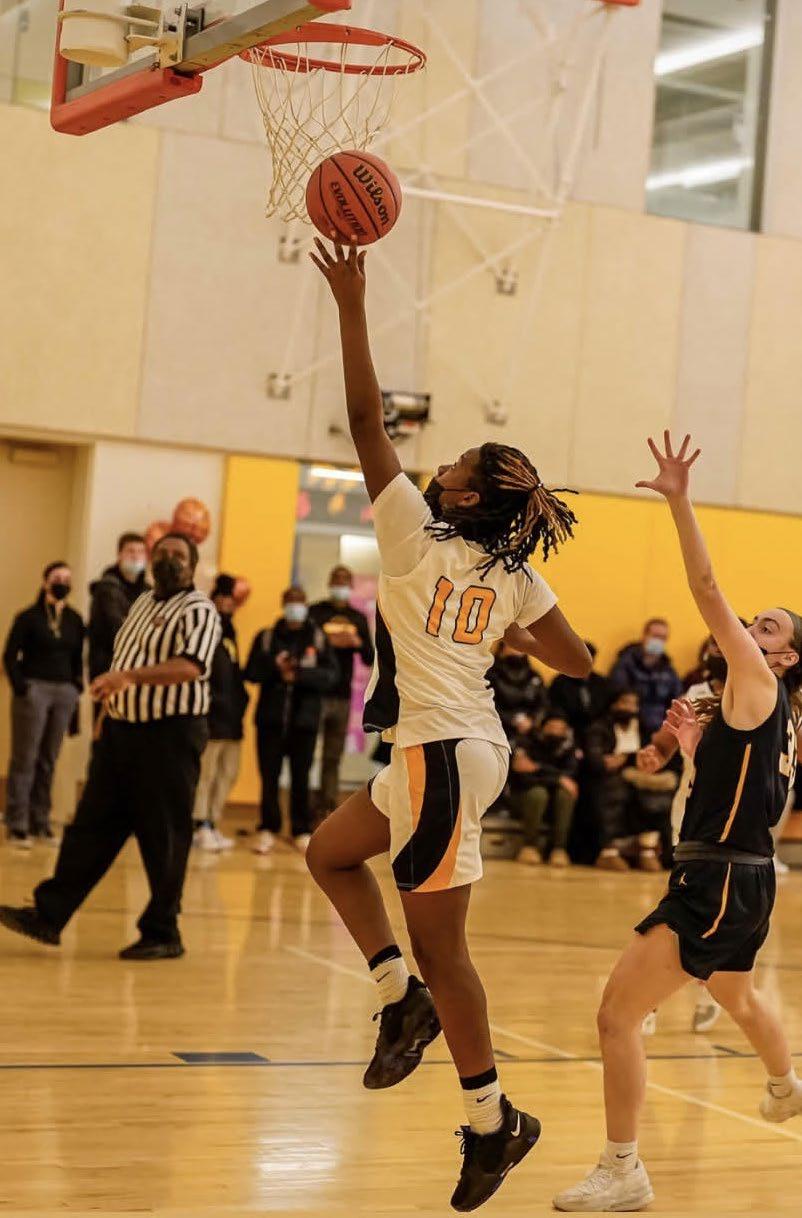
At the bleachers, I took off my black Crocs and threw on my shoes. Before I could even start anything, the coach came in. I stared off into space until I heard something about cuts which caught my attention: no one would be getting cut, but tryouts would determine if I’d make JV or Varsity. No cuts, thank goodness. Varsity as a freshman, almost too good to be true. We started drills and I shot with confidence. I was watching the girls shooting consistently and making tough shots. This was nothing like middle school. Half the girls there couldn’t even lay up. I ran the hardest and did my best. The Varsity and JV coach watching put a lot of pressure on me. I got out of my head and kept pushing. After I was done sweating up a storm, he called me over and told me I made Varsity. I did it. My first step to my journey of becoming Alani. The real Alani.
Basketball season was here so I got serious with my grades. I knew high school ball was going to be different. New team, new coaches, new com petition. I’ve only been playing since 6th grade. The horrid Mr. Pandemic canceled our season in 7th grade and 8th grade was a weird year. This was the real start of a new chapter in my hooping career.
My first few games I wasn’t starting, averaged about half the points my teammates did, until my coach told me to start the game against Brighton. I had to make sure I played great to stay in the starting lineup. I got things to prove. I have to make my mom proud. Plus I have to show my brother I’m better than him. Whistle blown, I come down the court and BOOM, three me. Next pos session had a TOUGH layup. I was feeling good and ended the game off with about 16 points. We blew the team out of the park. All my teammates were proud of me and I felt GREAT. Told my mom about it who praised me for the game I just played.
The next few games I play, I do great. I get rebounds, nice passing, good team work. I’m feeling myself. Only a freshman on Varsity and I’m killing it. Outside of bas ketball, I am maturing and doing way better than before, maintaining A and B grades, working, even keeping my room from looking like a jungle. I am becoming me. I’m maturing and becoming confident in who I am. My mom and my coaches kept me on track, making sure I was staying on top of my game, on and off the court.
Here comes one of the biggest games of the season, we play John D. O’Bryant. Last year Varsity went on to the City Finals looking for their 4th championship in a row. They played their butts off against O’Bryant and came through with a win. We knew they were coming back for revenge. I was starting that game, so I was nervous. I had to be my best and make good decisions on the court. Jumpball! We go back to back buckets until we’re up 20. I grab the rebound and start to head up in the air. I get hit. AND ONE! The crowd yells as I make the shot. I celebrate like I just won the lot tery. The game ends a few pos sessions later. I had only 10 points but they felt like 50 from the way I played. Had me feeling like MJ on the court. My mom gives the “good job” look and my coach congratulates me.
At home, I’m doing my homework and I get a ding on my phone. It’s my team. I opened the chat and saw the words “Boston Globe.”
As my eyes skim across every word something catches my eyes at the end: “Alani Hoilett also had an And-One lay up that had the bench roaring, she ended up with 10 points.” I reread it, making sure I wasn’t going insane, snatched my phone, ran down stairs to my mom like a crazy person. I showed her the article and she started smiling from ear to ear. I was ecstatic! I went from being nervous to even try out to being a star. Being in The Boston Globe made me feel like the sky’s the limit. I wasn’t scared about messing up or playing how I want. I became comfortable in who I am — I’m not nervous to try new things anymore. If I never tried out I’d probably be shy. Now I just take a deep breath and wish for the best. I’m going to keep working and look forward to seeing my name in a million more articles. Even after the season ended, I still put in work at the gym and make sure I put some shots up every week. No one is stopping me from making it far. Only I can mess it up for myself, and I don’t plan on it. I’m going D1, baby!
My name is Alani. I’m 15 going to the 10th grade at Lincoln Sudbury. I play basketball and also listen to a lot of music. I like writing about those things because it helps me really show my voice in my writing.

I had to make sure I played great to stay in the starting lineup. I got things to prove. I have to make my mom proud. Plus I have to show my brother I’m better than him.
 by cimmy holman
by cimmy holman
Cimmy is a 14-year-old boy who is just going into high school. When Cimmy was younger he had a very odd obsession with newspapers— every time he and his mother walked down the street he would always pick up a free newspaper from the box. Even though he has little to no memory of these events, his mother says that because of his obsessions with newspapers it helped lead him to becoming a journalist.
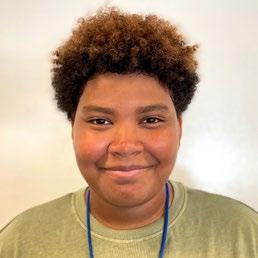
from the early age of six to now, a lot of family and friends would harass me like a Karen to a group of teen agers about if I had any sort of gift, talent and or passion — bombarding me with questions and having me try to do a bunch of things. And during this time when they would harass me non-stop, it felt like time stopped and all eyes were on me as an introvert that honestly feels nerve-wracking. It felt like everybody was putting all of their hopes and dreams onto me. But once they found out that I had no special talent, gift, or passion they would just move on to the next child and talk and gaw about them and their gift, talent, or passion. But you are probably wondering “Is he ok?” or “How could his family treat him like this?!” But I’m here to clear things up my family never treated me any different at all they still loved me a lot and cared for me just as everyone else but the fact that I had nothing I truly wanted to do in life made me kinda mad — so mad to the point where I would try almost everything in my power to hopefully find my talent.
When I was trying to find my talent the first thing I did was go to a music school where I learned how to play the violin, drums, and flute (I only remember how to play the flute and half the violin). And in that very same school they had a performance every two weeks. During those performances people who wanted to discover children would attend those performances and find a few lucky kids who wanted to pursue music as a career. But sadly my mother ended up pulling me out of that school once I finished fifth grade because while the school offered great opportunities for young children the teachers and the overall school just weren’t for me. Also, by the way, I played a little soccer at the same school but it was pretty uneventful and I don’t remember much that happened when I played. After I left that school I tried out for other things in my new school but sadly this school offered a lot less. The only thing this school offered was flag foot ball, basketball, and soccer. So out of the very limited selection of sports, I chose soccer. When I first signed up for soccer we had tryouts, tryouts were not very hard because I had done soccer in my old school so it not very hard. The tryout period was only two days long and after the two days, I made it on the team. Once I made it on the team, the practice had begun. I had practice every day Monday to Friday. When I think back to all of the games they were extremely tiring and exhausting because the feeling of extreme out of breath was so weird and painful it felt like an elephant was sitting on my chest, it was so bad to the point where I didn’t want to play anymore.
Now the next thing I joined in eighth grade was the debate team. Now the debate team is intriguing because little to no people wanted to join the team so I made it on almost imme diately. And this is one of the actual teams or clubs that I have shined through a lot. Throughout the debate season, there were a total of four matches not including the finals. In the first match me and my partner had, I won third place for the debater and then the second time I did it I won first place but sadly I could not attend the other two times because one of the times was canceled due to weather and they never we made up that match and the final match
I couldn’t go because of a school dance.
And finally the last activity I signed up for in eighth grade was TiP. It’s kinda weird because everyone who signed up for TiP did it for the money. Well I did it for the money as well but I also
wanted to see if it could be my talent. And as I finished the first winter cycle it was kind of weird because I feel as if I want to do it again so I signed up for the spring cycle and after the spring cycle it somewhat kind of gave me a sense of relief when I would be journal izing or writing so because of that I signed up for this Summer Journalism Institute and I’m happy to say that I have found something that could be a talent or a passion for me to do. And if you're going to take anything away from this article is that to all the young and old people don’t let other people make you feel bad just because you have no specific gift, talent, or passion, and if you ever want to find out what your good at don’t be scared to try things out and you shouldn’t be scared to try new things. ■
I’m Karína Myers, I am currently a senior at Boston Latin School, I’m a figure skater with the Skating Club of Boston, and my passions include theology and literature.

i first read a book on Greek mythology when I was about 8 years old. I can still remember its cobalt blue hard cover and stories accompanied by intricately drawn illustrations of deities like Aphrodite and Apollo, with crisp pages accompanied by the familiar scent of paper. I sat down in the living room of my family’s apart ment on the large black faux leather chair in the corner on a summer afternoon, comfortably seated and ready to devour the book's contents. Immediately, I was drawn in by the vast amount of different gods and goddesses there are in Greek mythology and became more and more eager to learn everything about them — their abil ities, their backstories, and so on — as I flipped through the tales within the book’s pages.
The story that first captured my interest was the mythology of Pegasus. Instantly captivated by the white-winged horse illustration in the narrative’s intro duction, I dove right in. The tale was so much more than I initially expected. It told that Pegasus was tamed by Bellerophon, son of Poseidon, who rode him into battle against the monster Chimera. It was so much more than an origin story, I felt as if I was there, so deeply immersed in the story that I swore I could feel the wind in my hair as if I was in Bellerophon’s place, upon Peg asus’s back, heading straight for the Chimera. Though I was first intrigued by a simple horse drawing, I soon learned that Greek mythology was a complex web of gods, heroes, and monsters, and each story came with a lesson or an explanation of why things were, or how something came to be.
The fact that I had nothing I truly wanted to do in life made me kinda mad — so mad to the point where I would try almost everything in my power to hopefully find my talent.
The remarkable collection of characters and stories within the Greek myth book that was perched on my lap sparked my interest in polytheism and religion as a whole. After I had finished it, I re-read it over and over until I committed every deity’s name and abilities to memory. And looking back, it was the first time I had read a book about religion besides the Bible and was eager to continue to learn about the multitude of dif ferent belief systems that I had yet to explore. A cap tivation with different polytheistic religions is where it all started, and I would ask my parents to take me to the library after school to check out books detailing the ritualistic celebrations surrounding ancient Egyptian gods, the attributes of Wiccan deities, and the doctrines of Hinduism. Reading about seraphs and isms and the seemingly magical aspects of all of these faiths seemed to have given me an intellectual rush — a yearning to learn more. All of the different religious denominations I read about had different perspectives on a higher power, and the tales of divine beings with supernatural authority had so much impact on the day to day lives of those who believed in them. That amazed me. Prayer, devotion, and belief could give people hope, security, and shape their morals.
Though religion continued to be a principal interest for me all throughout middle school, it wasn’t until high school — specifically my junior year — that I was pre sented with the opportunity to put all of my religious studies to the test. I was prompted to analyze texts with

heavy Christian references such as the epic Beowulf and John Milton’s Paradise Lost, and this heightened academic focus on Christianity in Western literature led me to be fascinated by monotheistic religions as well, and I became increasingly curious about how they affected the world around me — especially within works of art and lit erature. As religion became a commonly discussed topic in the classroom, the sig nificance of its effects on an individual’s worldview and morals became clear, and I comprehended that understanding religion served as not only a way to better under stand literature and grow intellectually, but also served as a bridge to appreciate dif ferent cultures and communities.
I have read more religious texts than I can count on my fingers, from the Quran to the Book of Mormon, and all have helped me to better understand people within my communities and get a sense of how they view the world in respect to their own reli gious beliefs. Though my peers found it odd that I cared so much about the New World Scriptures of Jehovah or the teach ings of Jainism, I saw the inquiry of different faiths as a looking glass into the mind of a group or an individual. Understanding how religion gave their life purpose and influenced their frame of mind made me excited! Doesn’t it make you excited too? Wouldn’t you like a window into someone's culture? Into their soul?
Not only did my enthrallment with religion spark my curi osity for studying religious influences on literature, but it also taught me a lot about diverse cultures. Religion doesn’t just serve as a way for me to understand litera ture but serves as a bridge of understanding with those of different backgrounds and beliefs than me. Belief systems act as agencies of socialization and therefore have connections to nearly all aspects of society today, and my long-held interest in the topic has influenced me to plan to study religion along with English in col lege to delve deeper into central concepts of varying belief systems and their influences on the humanities, literature, and the world we live in today. Divinity serves as a channel to develop intellectually and provides me with the opportunity to connect cross-culturally, which is a beautiful thing.
I hope that one day I can discover a path to relay my knowledge to others in such a way that inspires people to explore divinity’s impact on them, whether it's as an outsider looking in, or someone eager to make faith a more prominent aspect of their life, I believe religion has a message for all of us. ■
college is something very important when it comes to advancing in one’s education. With college, someone could get the opportunity to learn more in a specific field and later get a degree saying that they learned this information and have done all the require ments. In turn, that degree will give that person a higher chance of getting a job. On paper, it seems like a fan tastic and great idea. The idea of this process is worth it. To look for good colleges, to pay the tuition, take the classes, study, look for nearby housing, try to gather financial aid, go through the admission process, etc. College is a way people get to do what they want to do in their lives. To many, that is extremely appealing. Col lege greatly helps thousands upon millions of people in the long run, yet for many others, that is not the case.
For many people, especially in America, college is too expensive, they have a low GPA, the debt would be too much, they do not qualify for financial aid, affordable housing is non-existent, college doesn’t offer them the skills for something they do not want to do in life, etc.
Thus, these people will take themselves off to a trade school or other specialty/miscellaneous career. That is great for them. This is a totally acceptable way to go if college is not right for them. They chose something that was better for their situations, made them happy, and most likely gave them satisfaction with their own lives, yet many would disagree with this statement.
To most people, college is the only route. College is the way to go if you want to be “successful” in life. If you do not go to college, in their eyes, then you are a failure, or rather you are below the bar. If you decided not to go to college, many would consider you beneath themselves. They think that they are far better because they have a nice shiny framed degree on their wall. The reality of their words is that they are wrong. Who gets to decide what it means to be successful? To be successful in their lives on a broad scale. In our society success is defined by having a college degree, and then going on to work a high paying or rather “reputable” job. Even if you hate the job by societal standards you are successful, but no one gets to decide who is . That’s right, no one gets to decide that.
The definition of “successful” is to “accomplish an aim or purpose”. So, if success in life is defined as achieving a goal or purpose, it makes no difference whether people attend college or learn a trade. As long as they achieve their purpose or aim they set for themselves, it doesn’t matter. There is no requirement for succes sion, so people should live how they want. Yes, college may make getting certain jobs easier, but the truth is that either way, it is still a painful path to follow. Both ends will struggle at some points to reach that very end. To achieve what that person wants and not someone else’s.
This really shows how much we, as a society centered around education and careers, have been conditioned. How far have our brains been stuffed with the notion that college is the only way to go.
I do believe people should give college applications a shot, but by all means, they do not have to go if they do not want to. College shouldn’t be a forced thing in one’s life. It is a very big decision, especially when most apply to college when they are still in high school. These young adults who apply have their own circumstances and their own thoughts on the matter of college, so the decision is up to them. Not everybody else, not parents, not teachers, not meteors, etc. As humans, we have the authority over our own minds and bodies to choose the path that will lead to our success. ■
My name is Jacqueline and I enjoy writing about a lot of topics. Some of those topics include the art community, laws/criminal cases, society in America, astronomy, and animals.


being able to watch the world’s largest sporting event by far was a great inspiration for me. Also starting at an early age is a great way to be even better in the future just like every sport.
My parents were born in Africa and their soccer is very popular. My dad spent his childhood playing and watching. They take it very seri ously over there so my interest was almost des tined to happen. I do remember him and my uncle watching the 2012 champions league final between Bayern Munich and Chelsea but I did not pay attention to it. But once I started to focus on the techniques of the players I became more interested. Although the Cameroonian national team never really did exceptionally during the world cups my family continued to support them through the good and bad. The passion for soccer is not just in Cameroon or Africa, it is everywhere all around the world.
by max ngongai was six years old and in my room. My dad was cheering in the living room as Cameroon had just scored a goal. I am curious and I poke my head out right away to see what the ruckus was about. On our tele vision screen was the World cup game between Cam eroon and Brazil; I was immediately glued to it. I see all of the different dribble moves and the passing abilities of the players and it intrigues me. The game is not fastpaced but I continued to watch the full game and was able to absorb what was going on.
Throughout the rest of the tournament, I would watch all of the games and develop some interest in teams and certain players. I saw Mario Gotze, a player from Germany score the game-winning goal against Argen tina and my happiness faded away. I was upset but as a six-year-old I quickly moved on from it. The next year there was the champions league and every Tuesday and Wednesday I would come back home to watch either the group stage ( the stage where teams are put in groups of 4v and the top 2 advances) or knockout stages (Win or go home like playoffs). I sort of band wagon many teams. Eventually, I would stick with the team Paris Saint-Germain and follow them throughout many competitions.
Around this time I had not known much about sports. I had watched basketball for a little bit during the play offs the year prior but that was it. I did not know that It could be so fun to play with and interesting to watch. So
Most people may think that they do not want to be like their parents and although that may be true, sometimes you may be surprised at what they like, which then can also be appealing to you. I have heard people say that they do not like spending time with their parents and at times have valid reasons but at this moment when I was witnessing the world cup for the first time it taught me that my dad and I have very common interests and that I didn’t even know now. This could be due to the fact that I spend a lot of time around him but not really getting to know him as a person.
I do think that you have to learn as much as a kid and being little is the optimal time because you absorb everything around you and your environment can change who you are as a person. Currently, I am still highly invested in soccer and play a lot and I watch many games. Playing is a great way to exercise and the sport helps you connect with many people around the world. I started when I was about 7 and would play any where whether it would be in my house or outside and It was very fun. I would try recreating different skill moves I would see. The first in person at my school was made easier because I made the soccer team and was able to make many new friends. I also started playing the video game FIFA and watching YouTubers that played it as well and I was addicted to it. I am very happy that I spent time growing up and watching it because without it I have no idea where I would be today. ■
Max is 14 years old and goes to Boston Latin School. He enjoys soccer and likes to read and write.
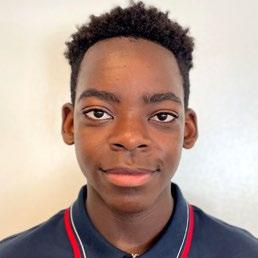
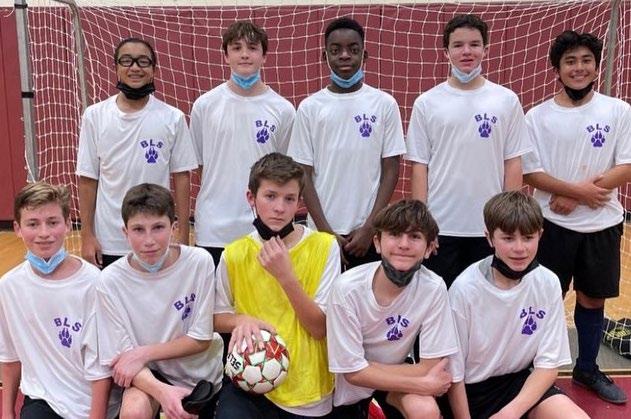
In Boston Latin, there is competition everywhere, and for me it was overwhelming to compete because I didn’t feel good enough. It started with the Latin worksheets for homework. As I heavily marked up my paper with my pink gel pen, I glanced around and saw my tablemates with little to no corrections at all. I thought to myself, “am I dumber than them?” From then on, the comparisons began. Whenever my teachers would pass back quizzes or tests, I’d sit by myself, frustrated that I couldn’t land a 92 like the student next to me. World History was the real nail in the coffin because I had to relearn two years’ worth of material to understand the curriculum.
when i first attended high school at Boston Latin, one of the first things that I noticed was the size of the building. It was way larger than any school I’ve ever been to with more than 2 floors and multiple eleva tors. My eyes widened in awe as I realized that I would be spending my next 4 years of high school here. The halls themselves were a maze with students of various sizes pushing each other to get to class. It didn’t help that rows of purple lockers also lined the halls, making it even more cramped than it already was. I felt intimidated but also excited, mainly because I thought of it as a “new school new me” type of deal. Not to mention, getting accepted into Boston Latin was already a big deal in itself.
I was a “Bsie,”a term Boston Latin uses to describe kids who start attending in 9th grade. I’ve always thought the label was weird, mainly because it felt like alienation even though the school wanted us to fit in with the crowd. However, the term was also a way for me to find my crowd of other Bsies, so I guess there were advantages.
As I attended Boston Latin as a Bsie, there were a few setbacks. I had to learn not one but TWO languages, one of which was dead. At my old school, language classes were never a priority, people would just goof around while the teacher played a movie on their pro jector. On top of two languages, I had World History in which I surprisingly survived with decent grades. My old school didn’t have a proper history teacher. The last his tory teacher I had who taught was back in 6th grade (mind you I was in 9th grade at the time). With all these factors into play, things began to spiral downhill.
I didn’t notice these behaviors when it first started, mainly because I was so obsessed with my grades and success. The toll this took on my mental health and my self-esteem was heavy. In my room, during term finals in the first half of November, I snapped.
Drowsy from waking up from a 3-hour nap, I groggily grabbed my books for another all-nighter. Halfway through, I suddenly heard my door fling open and saw my mom on the other side. It was customary in Asian households to not knock on your child’s door before entering and my parents were no exception. Immedi ately, the battlefield commenced between me and my mother, ready to make our moves. However, victory was clear in sight as I knew the perfect move to knock her down. It was the good ol’ “LEAVE ME ALONE,” but what had been my victory suddenly felt like my loss.
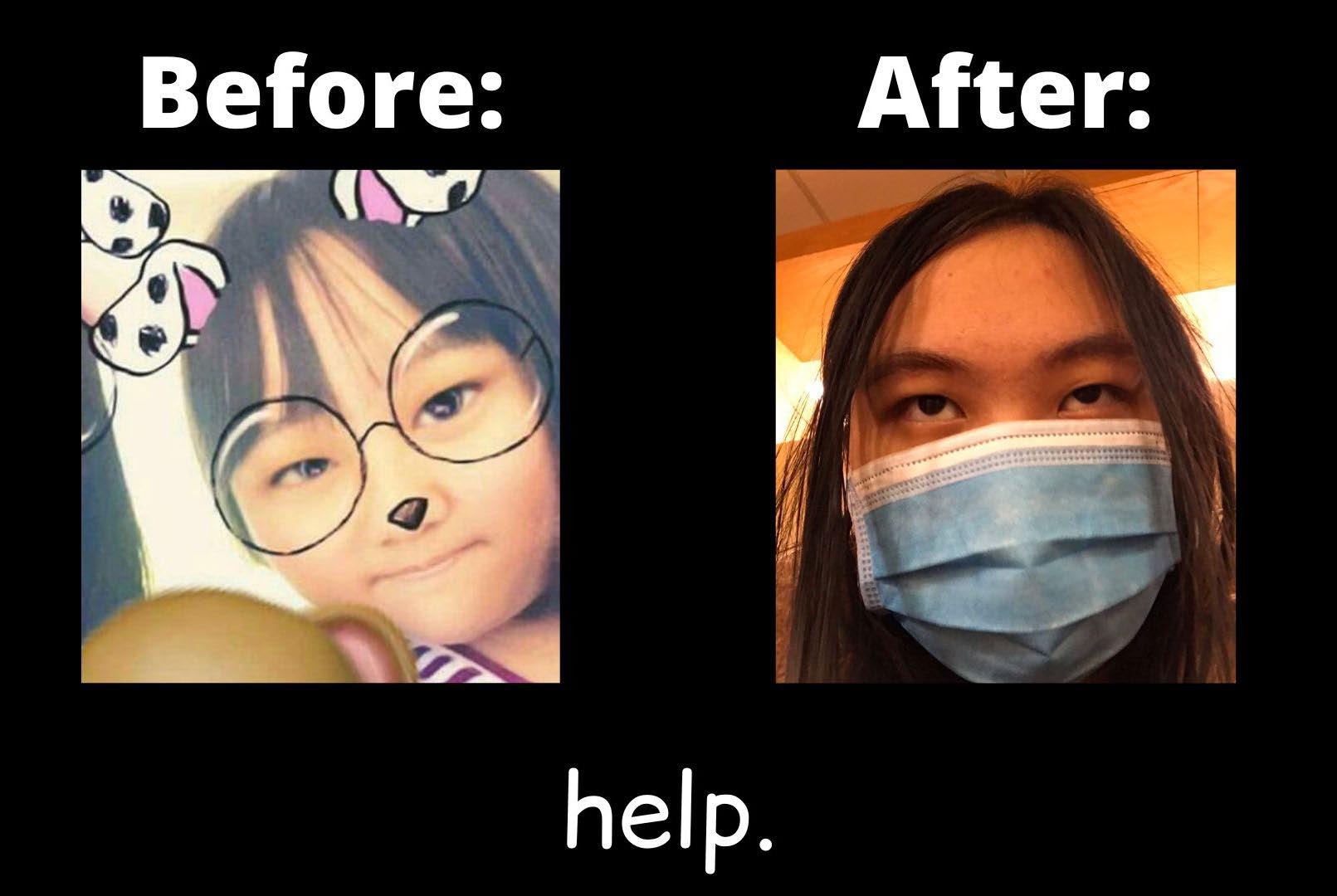
My mom’s demeanor grew grim and her resolve was broken; I had hurt her.
My dad eventually intervened on the battlefield to help us find peace. I remember it took me a while to open up, but my mom was a storm of emotions as if she had saved a whole decade’s worth of worries to chuck at me. I was too stunned to speak, to the point where I couldn’t maintain my composure and broke down in a ball of tears and snot from all the stress.
When quarantine hit, it was a time of isolation, but also self-reflection. With less work on the table and more time for relaxing, it came across my mind that I tended to compare myself against others. At first, I didn’t believe it because I’m myself, why would I do that? Pondering about all the times I degraded and emotionally hurt myself, I didn’t want to go through that again for the rest of my high school career. What happened to the “new school new me” vibe? Deter mined and for the first time, I slouched back in my chair and gave myself a vibe check.
Returning to school, I set myself limits by knowing which classes I could and could not handle. Not to mention, being able to choose classes that weren’t academic into my schedule, I quickly picked up art because it was something that I enjoyed. I didn’t care if I didn’t stack 4 AP classes on my plate as long as I was happy.
Looking back at myself now, I’m glad to have been aware of these destructive behaviors and improve on them. Had I not reflected on myself, I probably would’ve been a comparison automaton. That is, it’s not like I haven’t stopped comparing myself com pletely, but not as frequently as it previously was. Sure, it’s the occasional “oh, their work is better than mine,” but I know not to let those things determine who I am. Rather than be pessimistic, I like to think that everyone has their strengths and weaknesses and that I am my person and should focus on making myself happy rather than live up to those around me. Living this way for the past year has made my junior year surprisingly less stressful and fun. I got to connect with others I hadn’t known before, touch grass,and improve my grades! ■
Jazlynn Truong (she/they) is a 16 year old, heading into her senior year at Boston Latin School. She mostly spends her time hanging out with friends and drawing digitally at home. For her involvement at TiP, she has written a handful of articles at TiP about topics ranging from pop culture to local issues. TiP, to her, is a place where she can voice her opinions without academic restraints.
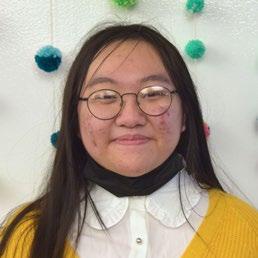
My name is Jacob Tucker, and I was born in Boston. I spent a portion of my life in NYC and Georgia. I’m an athlete and I like to play sports like football.
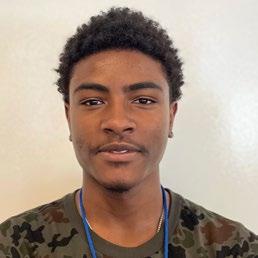
it was a very humid day, the air felt so sticky and dry, my team and I just arrived at the opponent’s foot ball field which we were going to be facing. Everyone unloaded all the necessary equipment from the coach bus such as cleats, water coolers, and other football material. We began setting up what we called flex which is just basically warm-ups. I can vividly recall how we all tried to hype each other up with the pre-game speech; it felt like a drug with the amount of energy it gave you. When kick-off started our morale was high and our energy was through the roof. But slowly as the game progressed on, I started to get visibly upset because of how much the team kept dropping the ball. But I knew getting upset and focusing on the score would not ben efit us at all; in fact it probably made it even more dif ficult to win. We had our little half-time pep talk which sort of boosted our self-esteem. We came back on the field-hydrated and ready to take the win; but our high spirits weren’t quite enough as we still lost. I remember thinking, “What a horrible way to start the season.” After some words of encouragement, I packed up and headed to the coach bus, ready to leave.
While I was born in the very boring city of Boston, I was not raised here. I spent the first half of my life in Georgia and the other half in NYC. I grew up with 3 brothers and 3 sisters. Living in Georgia where there were so many fields it was nearly impossible if you weren’t doing some sort of sport as a kid. I was always playing sports but didn’t join an actual team until middle school. I started middle school in New York and this is where I was introduced to team football, which eventually led to me liking and continuing to play in high school. My mom had concerns, mainly being the fact that I have asthma and the season football starts when I start to get sick and whatever but she eventually allowed it.
Once I joined the football team I started to get a taste of the actual tackle football sport. I was not prepared for the hell that came with it. For example, getting hit by someone who can legally drive a car after just grad uating middle school is not fun; the worst part is it’s not an instant hurt. It’s after a few minutes you can feel your chest stinging and your eyes start to water kind of hurt. Going home every day tired, legs barely managing to hold yourself up was not what I was expecting. Since the pandemic, the junior varsity and the varsity teams had to mash up. Allow me to paint the picture, you’re a 14–15-year-old going against your older counterparts who are 16–18-year Olds. The conditioning was brutal, having to run until your lungs felt like they're bleeding and begging for you to take a break. This didn’t deter me though, the sport was just too fun. The team was supportive as well; older players always looked out for you and helped as well.

After that game practice became even more extreme with our coach emphasizing that we needed better teamwork, callouts, and focus. About a couple of days in I could already see the improvement that happened because I started to talk to my teammates more, give callouts and help them correct their mistakes. Cut to a few days later and we’re in our next game; not so shockingly my team ends up winning. But it didn’t stop
there, not only did we win that game but every single game after that we dominated. We were leaving our opponents with little to nothing on the scoreboard. That experience taught me that I was a contributing player of the team and needed more team effort, practice, and better communication if I wanted to do anything. And this doesn’t just apply to sports, anything that requires a group effort you should always try your best to be a team player. In life, a lot of people are going to prefer working by themselves but that’s not always a choice to it’s always good to be able to work well with others.
In the end, what I was taught by our coach was that I needed a lot more communication and that we had to be better teammates. And I think it paid off because in future games we no longer ran into each other trying to catch the ball or putting teammates down for their mis takes; I was taught how to be an actual teammate. Now I could say that I am a better teammate than I was when we had our first game and I like to look back every now and then to see what I have improved on. In conclusion, being better teammates to each other ultimately led to us becoming the number one JV team in the cup divi sion in New York. Cooperation is not only relevant in sports but in all aspects of life. Oh, and our other coach made the news for winning C.O.T.Y and got a shoutout from the NYJ (they suck but it was still cool). ■
The conditioning was brutal, having to run until your lungs felt like they're bleeding and begging for you to take a break. This didn’t deter me though, the sport was just too fun.
I’m Clare Ablett, I live in Dorchester and I am a rising junior at Boston Latin Academy. My passions include rock climbing, softball, and reading.

of course the music had decided to die during this song. The song that we barely knew. The song that was mainly mumbling and spinning and hoping it would end. The speakers crackled once more, attempting to spit out the lullaby-esque backing track, before sputtering to death. I wiped the sweat off my forehead. It was too hot for this. As I spun around wildly in my makeshift penguin costume, I made eye contact with my fellow castmates, who were now my friends, and exchanged a pained look. Meanwhile, I avoided the gaze of the confused second graders in the audience like it was my job and tried to sing.
It was all very on brand for the whole experience. With just over a month to prepare, a lack of budget, and our concrete courtyard as a stage, my school had been led to choose Madagascar Jr. the Musical to perform to end the year of online learning. Mad agascar Jr. didn’t exactly spark excitement in me. To be fair, as a ninth grader, I wasn’t the target audi ence. Neither were any of my classmates. But after sitting on my computer alone for hours every day, I was starved for something new. So I threw together a video audition and took my role as a penguin and a fossa. It wasn’t going to make up for the canceled Beauty and Beast production from the year before, but it was something.
I barely knew anyone. For some reason, my grade had decided they did not care for a children’s musical about zoo animals, so there was only one other person from my grade. Not that it mattered much, I raced to get to rehearsal after closing my computer on my biology class. I bonded with the other pen guins and lemurs over the pain caused by the safety pins that secured our tails and the plastic leaves that stained our hands green when it was hot. I was over joyed just to see people every day since most of my social interaction for a year had been through a screen.
By the time the audio decided to inconveniently break, we had already performed twice, once for some first graders, and once for the few people who were at school for hybrid learning and apparently had nothing better to do. We had perfected, or at least pol ished, our costume changes and microphone hand offs. We had the feeling that we were only getting better, that with every performance things would fall into place. I would learn my cues like the back of my hand and finally figure out the perfect speed for me to run to get onstage on time. Maybe we would even get a few high schoolers in the audience to laugh or show any emotion besides utter boredom. This per formance did not line up with this theory in any way, shape, or form.
From the first second, the speakers made it clear they would not be cooperating. I froze in place in the muggy greenhouse that was serving as our “backstage.” The rest of the penguins even stopped trying to hide my oversized pink shovel between the rows of plants. We held our breath, hoping it would
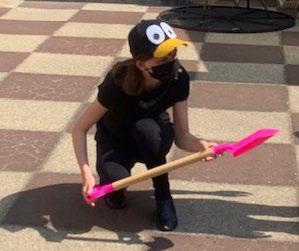
somehow fix itself, that we would be able to hear the next note or next line clearly, but it only got worse. The microphones wouldn’t come through, the songs kept glitching, and the volume was a wreck. We couldn’t hear our cues and the audience couldn’t hear our lines. Worst of all, this was the performance we were recording, in case someone somewhere felt like they were missing out by not seeing Madagascar Jr. the Musical. Yet slowly our nervousness began to fade. This would not be our best performance by far, so we stopped obsessing over nailing every dance and song and instead turned our focus to entertaining our selves and the overheating second graders.
Of all the performances we did that week, this one jumps to mind first; the chaos, the heat, the laughs that we had about it afterward (and continue to have). The kids kept dancing along and we stopped caring, for the most part, that our audio was broken. We knew that this whole experience was crazy and that this show was probably our worst one, but it didn’t matter. It wasn’t about the quality or the audience or the fact that everything was going wrong. It was about having fun, singing, and dancing with our newfound friends. It was about enjoying our selves in the middle of all the mess.
I still do theater at school, which thank fully no longer takes place in the baking sun of the courtyard. Even with the location change, we still have our fair share of tech disasters and mishaps. Now I laugh when I think about how nervous I was to perform in front of elementary schoolers because now I hardly worry about the audience. For me, it isn’t about impressing them anymore or attempting to make high schoolers laugh at dancing penguins. It’s about sharing these moments, especially the crazy and stressful ones, with my friends. When something does go wrong, when we mess up a dance or the audio breaks, I still get stressed for a moment before I remind myself it isn’t about being perfect. Besides, perfect moments don’t leave you with as many stories to tell. ■
The kids kept dancing along and we stopped caring, for the most part, that our audio was broken.
was of utmost priority to the mass. It tried to protect it as much as it could, to shield it as best as she could. Its teeth scraped and chipped, its eye bloodied and dry, its hair bleached and ruined, her body remained the same. It would be better if that mag azine had just flown out of her life, but her obsession was already set. Each day she’d exert herself to count less reshaping attempts. To try and piece herself together, but it would always droop back down, in a slow and sludgy style. Perhaps if her mind hadn’t tried so relentlessly to keep going, she would have stopped. But instead, nothing changes, and she continues to try again, only to end in her misery.
the sun simmers lightly upon the wasteland. The skies are clear and empty. The arid lands bear no plantations, left suntanned and stained. Light winds drag landscapes to hurl sand as shrapnel. Dead trees stand pridefully as a constant reminder of the forgotten, lettered with a “told you so”. An ol’ lone, worn, and sad house tries to tread on. Its roof was riddled with holes, and walls were soon to collapse. Rotting wooden beams stand high without any of the confidence those branching tombstones have. The door leans on its side with one hinge left at the bottom. A doormat lays in front of the weary barricade, bleached and tainted to a boring and mundane orange to blend in. Nails point out haphazardly to point out each scratch and imperfection. An isolated light bulb dangles from the middle beam of the roof, swaying side to side to try and reach each nook and cranny with the most minuscule of hopes, only to further disappoint them when it sways back.

Somehow, without reason or rhyme, something still remains in the sar cophagus. A short and stout figure, shadowy and dark, even when the light bulb dangles towards them. It has arms better described as tendrils that drag along the floorboards. A large eye smack dab in the middle of the mass tries to push aside its subsiding body that impairs its own vision. Teeth attempting to form any type of resemblance to a mouth as it is constantly washed away. Its hair floats at the top of it, each thread dis tinguishably messier than the first. It tries to hold itself together, into the feminine figure it saw in the magazine. She was everything it wanted to be. Despite it still being worn from constant wind and sand, the magazine
To be fair, nothing has changed for a very long time, except the slow decay of her house, and the growing reminder of this planet’s extinction.
To her knowledge, everything else is dead. Everything within her proximity is decaying, so why bother looking for something that isn’t? Besides, it prob ably wouldn’t take much for them to start decaying too. The reason she gets to stay is to be a cruel joke to the gods, a jest for them to laugh at after the rest angered them.
One day, the decay of the lowly string that kept the bulb up finally took its toll, and down when the only light after the beaming sun. Nights were lonelier, with no one but the rising moon. There was a primal sense of fear, despite the fact that nothing could be lurking in the darkness, as it would much rather do anything else to survive than lurking. She couldn’t look herself in the mirror as well, and the magazine soon was left untouched after hampered time. She began to appreciate the day more, as the golden light was something she had taken for granted, but she had also begun to appreciate the night more, as she longed for a time where she could blend and meld into her backgrounds.
During the midst of the night, she had found a rustic box lit from the dim glaze of the moon. She had not seen
where it came from, or what it was for. It had a label warning to “handle with care.” The box was littered with pointed holes on the top. Out of morbid curiosity, she opened the box to find something completely foreign. Life. A baby duckling, curled into a ball that waddled and flinched and tripped and wailed. It was like nothing she had ever seen. She’d only seen remnants of what could be life. The sticks and branches of weeds unplucked and rooted were the closest things. She’d simply sit there in absolute shock and awe at the golden fluff that rolled around in dust and sand. Its feathers were very dirty, and it shook and trembled. Despite this, it still joyously bounced around like a magazine fluttering in its flight. She was frozen. Life was a little more than a myth to her, and she was complacent in her rot. What was she supposed to do? Everything was telling her that she could not allow such an unknown and unpredictable force to reside in her home, but that same part of her mind that tried to shape herself into the women in the magazines told her to keep it safe by all means. She was not the most rational, so the duckling stayed the night.
The first night was the hardest. She had tried her best not to ruin the gleam of its feathers while keeping it warm, but there was no good way of doing that. Her hardwood floors had potential splinters. Her furniture was far too worn to be of any use. The doormat was rugged and tough, but it provided a little more time for her to think. She looked down at her magazines, the things so pre cious kept in pristine condition. Even then, the paper had discolored and ripped.
Her sorrowful eye continued to peer, to wonder if this was worth it. Her instincts come to clash; her rationale told her this was her last comfort, a guarantee in her life of vague mystique—something to pin her down in reality, but as further proof of the lack of her rationale, she would lay the paper wings over the golden wings. She’d lay herself over as well; its rich gleam mixed with the blackened mass. Whether it was to further protect the duckling as her own or to protect herself from the grief of losing what she once prized, only its veiled tears would tell.
She looked into the mirror and saw herself, like normal, but that usual judgment and shame were replaced by a glance backward to the duckling running along the cup board, so she’d run along to catch it. When it was thirsty, tears would have to suffice. When it was hungry, it would clean its caretaker of her black sludge. It started to grow larger than its caretaker while she had shrunk bored with pores the size of craters. The hair had to be mixed with the muck of her body. The harder parts, like the teeth, had to be removed and chewed away, eroding similarly to the worn house. The pain was of no notice to her; she had felt it all before. She didn’t miss her limbs; they served no purpose but to fill her with misery. But the duckling was no glutton. They would rather spend days running around the enclosed space with innocent optimism which lit the rooms in place of the broken light bulb.
Days of feasting were ones of sorrow and solemn rather than solace. Yet, they con tinued to live; to grow, while she had continued to further sacrifice herself willingly for a hope she irrationally believed in, knowing what the future lies in reality. She wore thin, not questioning the end of it, but what lays after, when her precious has nothing left to feed. She questioned whether it was humane to prolong such a death, but her glances away from the mirror to a proud duck in this lonely home gave her no other choice but to love with all her heart. A day came when she had exhausted all of her resources, nothing but an eye. The sun had risen the highest it’s been. Her sorrow shined through, sad not of the end, but that she could no longer provide. The duck begged her to stay, but she had insisted she was not of any use anymore. In one merciful gulp, her sorrows were swallowed to the bottom of their hearts. And the moon glimmered like no other day until it couldn’t any longer. ■
Greetings, fellow humans! My name is Christopher, but you can shorten it to Chris. My writings usually focus on imagery, storytelling, and mental health awareness. I’m probably watching YouTube or playing video games.

She questioned whether it was humane to prolong such a death, but her glances away from the mirror to a proud duck in this lonely home gave her no other choice but to love with all her heart.
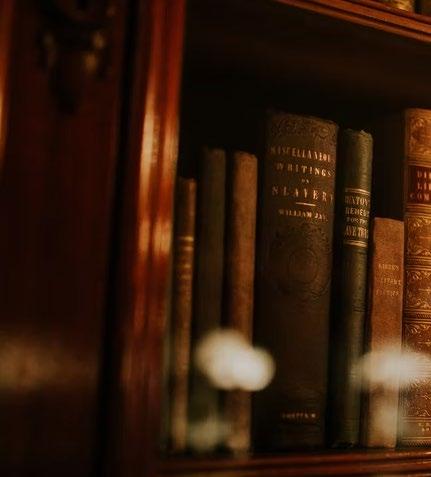 by gloria ekechukwu
by gloria ekechukwu
i live in hyde park, a small neighborhood in Boston. Where the roads are always clear, and the people are active and about. I wake up to the dim sunrise in the early morning. I sit there admiring the soft sun coming up to the sky. The funny thing about Hyde Park is, since it’s so quiet, you can hear wildlife wake up with you. Like the cats meowing and the dogs barking, as well as squirrels peeking out of their trees. I can hear the birds chirping as I move my arm over to my phone. I always go through Snapchat first. I see all the things my friends are doing. Going out to a restaurant, cruising on a boat, going to a soccer game. I mean, that’s fine. Life isn’t about going out all the time, I guess. I then move on to Instagram, I scroll through the stories of my “friends” and “living life.” Going to a party, hiking in a forest, reciting a speech to a large crowd.
I’ve woken up and in the first 20 minutes, I already felt like I’d drained away half of my life span. Whatever. I swipe onto Twitter; Ah, Twitter, my favorite social media platform. Where I scroll through meaningless and funny memes. I get up to take a shower and begin to get ready for the day. After my shower, I get all dressed up and make my way to the MBTA bus stop. I always hate catching the MBTA in my area. The bus always either comes late or always comes early. There is no in between, therefore I am annoyed. But anyway, as I’m standing waiting for the bus alone, two girls walk together and join me to wait for the bus. The two women were chatting it up, laughing, and enjoying themselves while waiting for the bus? I mean, not everyone is like me. Of course, they’re going to be chill about it, they’re friends waiting for the bus and I’m here alone waiting for the bus. Big difference. The bus arrives and I get on. Some days it’s filled to the brim, some days it isn’t. Today, it is full. Of course, it would be full. It’s a school day, and it’s school hours. Oh, what’s school hours? A phrase I made up to describe the average time everyone that’s going to school gets on the bus. Usually, it lasts from 7 to 9:00 AM.
As I enter the bus, my heart starts racing. My body starts to heat up as I try to squeeze into the packed space. It feels like I’m going to die. I finally find a space where there is a little leg room and I stand there as the bus begins to move to its next stop. As I’m riding the bus, I
notice how loud it was inside. The two women in front of me were having a conversation about the weather. The group of kids in the back of the bus was talking about a basketball game that happened between a rival school. The old ladies in the middle of the bus were all speaking in Haitian Creole. While I was doing nothing. All I could do was plug in my ears and listen to music. As people got off, I was able to sit down and relax.
Finally, I arrive at my stop and walk down to school. As I enter through the door, it becomes very lively. Groups of kids walking to their classes. Teachers hanging out, talking about how their classes went. Students in the classrooms messing around. It’s a very lively environ ment that I observe. Many play sports or join academic clubs, but I’m there doing nothing. I go to school, do the work and get out. I do find a small enjoyment in walking around the neighborhood and exploring. I would go to the library to see if I could get any work done but also chill there to play games. It was a sort of hangout place for me. I didn’t have anything to do, so I wasted all the time I had in the library. It becomes late and I make my way out of the library and come back home. I get home and immediately plot down in front of my laptop scrolling away. The bright and flashy colors are so dull to my eyes as I keep scrolling. I get tired and go to bed, then I repeat everything the next day. It’s like a cycle. Every day I do the same things over and over again.
Image courtesy of Clarisse Meyer on Unsplash.
I know, it sounds like purgatory. Some times it feels like it. There is no substance in doing the same thing every day for long periods. Of course, these cycles break from time to time, but they always come if you don’t do anything to combat them. I noticed that in this cycle of mine one thing stands out, I have nothing to do. But then I realized I needed a hobby.
Everyone I know has some sort of hobby or activity they do to fill in those extra hours. Like eating out and hiking. I thought having a hobby would mean leaving your house and doing something. But soon I began to understand that hobbies didn’t always have to be outdoors. They could always be something you could do at home. Cooking, for example, that’s a hobby that people do at home. I was sitting on the couch in the living room of my house. It was a bright and sunny morning and I could smell the pan cakes frying on the skillet. I was scrolling through YouTube on my smart TV and I was very bored. As I was going through the videos on the recommended bar, I stopped at an Oversimplified video. “The Amer ican Revolution - Oversimplified”. I thought
I could use some of my time to learn something, so I clicked on the video, thinking I would drop it in 2 minutes. Little did I know this event would lead me to single most finally discovering my special interest.
I was never a history fanatic before. I thought it was a very boring sub ject, nothing particularly interesting about it. But studying it soon became my hobby. The YouTube channel, Oversimplified, helped me get into the subject in a fun way. He made videos on specific wars/events in history and retold them in a way that was informative. His content paved a way for me. Instead of feeling like I was wasting away doing nothing alone, I found something to do. I wanted to know what happened, when, and how. I started reading more and involving myself in online com munities that appreciate history. I felt like I was pouring all my time and more into the past. In a strange sense, I didn’t feel as alone as I did before. I now have something to put energy into, rather than focusing on irrelevant things that weigh me down. I have a hobby that can distract me from the hardships in my personal life. As well as giving me a library of knowledge. It’s a win-win.
Studying the subject of history has taught me so much about hobbies and ways I can use my time. I always thought I couldn’t do anything about the time I always wasted. I thought I would be in a repeating cycle forever. But it doesn’t always have that way. All I had to do was find something I’m interested in, and that was it. It takes up half of my mind and keeps me busy for hours of the day. His tory isn’t the only thing I got interested in. I got interested in music and its history, books, movies/TV, crochet/art. History paved the way for other interests to form. It makes me feel alive. We all need something like that to keep us going. ■
Hello, my name is Gloria. I like history, games, and movies, among other things.
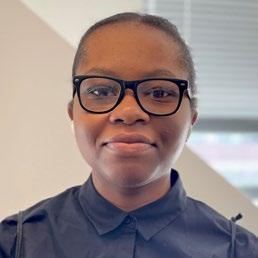

I thought having a hobby would mean leaving your house and doing something. But soon I began to understand that hobbies didn’t always have to be outdoors.
since the year of 1983, the birth of the internet, things have changed. Information was transferred at an unimaginable rate 10 years ago, and humans were able to connect with ease. As the internet developed throughout the years, the amount of information that was shared also increased dramatically. In 2005, how ever, one information-sharing superstar was created. Its name is YouTube, and now it is the biggest video-sharing platform on earth.
In the present day, because of how saturated the internet is with information, despite how search engines such as Google managed to filter and prioritize more important information, people began to search for more efficient ways of absorbing information. Many people’s inability to receive information quickly has turned them towards YouTube, which has risen in popularity in the last 10 years, thus beginning the debate about whether watching videos is better than reading to efficiently receive information. While the older generation still largely thinks that reading is better, the newer gener ation, especially Generation Z, argues that video watch is better due to its enjoyable watching experience, its gradual growing influence, and its graphical demonstra tive power.
Due to YouTube being ultimately entertainment, video watching is considered to be generally more enjoy able. While most books that serve educational pur poses are text-based, meaning that they rely on heavy reading, which can get boring for a lot of people pretty quickly, most videos will have various ways in the back ground that encourages further watching, such as back ground music, interesting animations, or just straight up comedy. Even though books can also induce funni ness, videos can do it at a much greater scale, through audio, motion, visual, and of course, texts. Compared to videos, books stand in no competition when it comes to encouraging their audience to keep reading.
According to a survey done by Pearson Study, Gen Z, short for Generation Z, is more interested in learning from watching videos rather than reading books, while comparatively, millennials are more into reading rather than watching YouTube. While it may be heavily influ
enced by today’s social media usage, there is no doubt that YouTube is becoming a more popular way of learning compared to reading. It is also worth noting that since most Gen Z have also taken both reading and video-based education at a young age with the rise of YouTube, especially in elementary and middle school compared to millennials, there can be more weight in their opinion, and represents our future direction for technology usage.
Here is one big advantage that video holds against reading, and that is its graphics. Books can never have moving pictures, excluding the ones from the Harry Potter movies. As a student, there are going to be concepts that are abstract to describe using language and images alone. For videos, however, the options become wide open. You can use anima tions to demonstrate a certain phenomenon, or even better, straight up perform an experiment that can be recorded on video to demonstrate its results in detail. It is also much more accurate since there are many ways to exemplify certain details in a recorded video, such as slow motion, timelapse, and editing.
Although videos carry all of the advantages, there is always one flaw in comparison to reading that people often bring up, and that is the amount of informa tion that it can carry within a certain amount of time. Reading, no matter how much people dislike it, can be rather concise. Something that a video needs 10 min utes to explain can be read in an article within two or three minutes. Though densely packed, people can often figure out what they need to understand using skimming techniques or simply read faster. While this kind of efficiency of reading can apply to many people, the lack of efficiency when people use this method applies to a lot more. Reading has become something that is more or less difficult to do, and there are always going to be people who are unwilling to learn. Towards these audiences, it is way easier to just watch a video on something they are even just some what interested in rather than reading a whole page of words. In this way, more people, who are not so inter ested in reading books or are not so efficient at reading
Books can never have moving pictures, excluding the ones from the Harry Potter movies.
Image courtesy of CardMapr.nl on Unsplash.
themselves, can turn to watch a video on a similar topic and receive information at a much more comfortable and perhaps faster rate.

In the modern age, as technology progresses, so does our way of communication. No matter how new and long-lasting the method of video watching is, it is pos sible that soon enough, something even more exciting and efficient will come and start another debate about how this, video watching, and perhaps reading is better. What is important within those arguments though is to keep an open mind. It does not matter which way is argumentatively better, but what matters is which one that fits you the best. Some like reading a book, some like watching a documentary, and some mad men may like a wire attached to their brain and just know every thing in the world. You always have freedom, and you have the choice. ■
My name is Payton, and I am a rising senior in Boston College High School. Because I am big into video games, I made a lot of mistakes during my life. Thankfully, after some thinking and adjusting, I am now able to live my life and tell my story.
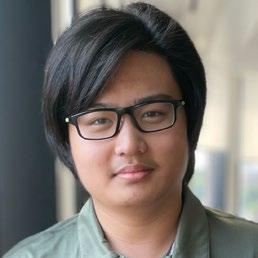
lately, there has been a lot of controversy with Mar vel’s new Phase 4.
Phase 4 takes place after and follows Marvel’s very successful “Infinity Saga”. Ever since the First Iron Man movie was released in 2008, Marvel has almost always made hundreds of millions at the box office. Marvel’s Phase 3 made about $13.505 billion with 11 films. Phase 2 made about $5.269 billion with 6 films, and Phase 1 was just $3.8 billion with 6 films as well. The amount of money made from the phases alone tells us how influ ential and popular the MCU has become over the years.
Marvel’s Phase 4 started in January of 2021. Since then, there have been seven shows and five films released, and there are still many more to come. So far, the five films have made about $2.5 billion. Even though the films have made a good amount of money so far, they aren’t as popular with fans as the previous movies. Marvel started strong with movies such as Shang-Chi and the Legend of the Ten Rings and Black Widow, but then the quality of the later movies didn’t hold up. Avengers: Infinity War and Avengers: Endgame was the biggest Marvel movies, and Marvel thought they could continue their success by making movies the same way. Many fans felt as though the Shang-Chi trailer told a lot of the plot of the movie. Despite that, the movie was very successful at the box office, as an origin movie, with almost half a billion dollars made. Black Widow made almost $400 million from both Disney+ and cin emas. It was a great mix between comedy and action and it took place before Black Widow’s death so fans were able to see a little more about their favorite hero.
When it came to Doctor Strange in the Multiverse of Madness, though, many fans had problems with the CGI. Compared to previous MCU movies, it wasn’t expected from Marvel. That has never been a problem for Marvel up until the movie was released. Fans expected a lot more than what the movie gave them. They felt the CGI was low quality, and many characters that were hyped up were not even big characters and were killed off
and/or forgotten in a matter of minutes. Cameos and rumors for the movie became true, but they became disappointments in the end.
Many fans argued Thor: Love and Thunder was not as good as its predecessor, Thor: Ragnarok. The director, Taika Watiti, was able to make a perfect balance between comedy and action/plot in Ragnarok. However, Thor: Love and Thunder was more of a comedy movie than anything else. According to MovieWeb, many fans have called it “disjointed and badly edited, while others have praised it for its bombastic, loud and undaunted vibes.” The comedy greatly overpowered the plot and action.
WandaVision aired in January 2021, Falcon and the Winter Soldier aired in March 2021, and Loki aired in July 2021. WandaVision received a whopping 91% on Rotten Tomatoes and an 88% from the audience score. WandaVision was a very big topic for months because of how popular it was. Fan theories were popping up all on the internet, and people were invested. Not many people were excited about the Falcon and the Winter Soldier series, but people still watched it. It had an 83% on Rotten Tomatoes and an 84% from the audience. It wasn’t what people expected because it focused on two “normal” heroes who didn’t have powers like a lot of the other famous MCU characters. When Loki was announced, fans were impatiently waiting for it to air. By the end, it received a 92% on Rotten Tomatoes and
a 91% from the audience. And just like WandaVision, it was a hot topic for months. Based on this, Marvel’s Phase 4 was off to a great start.
Listed next are the Phase 4 shows and films released in order with ratings by Rotten Tomatoes to audience scores based on Rotten Tomatoes.
• “Black Widow: 79% | 91%
• What if…?: 94% | 94%
• Shang-Chi and the Legend of the Ten Rings: 91% | 98%
• Eternals: 47% | 78%
• Hawkeye: 92% | 91%
• Moon Knight: 86% | 91%
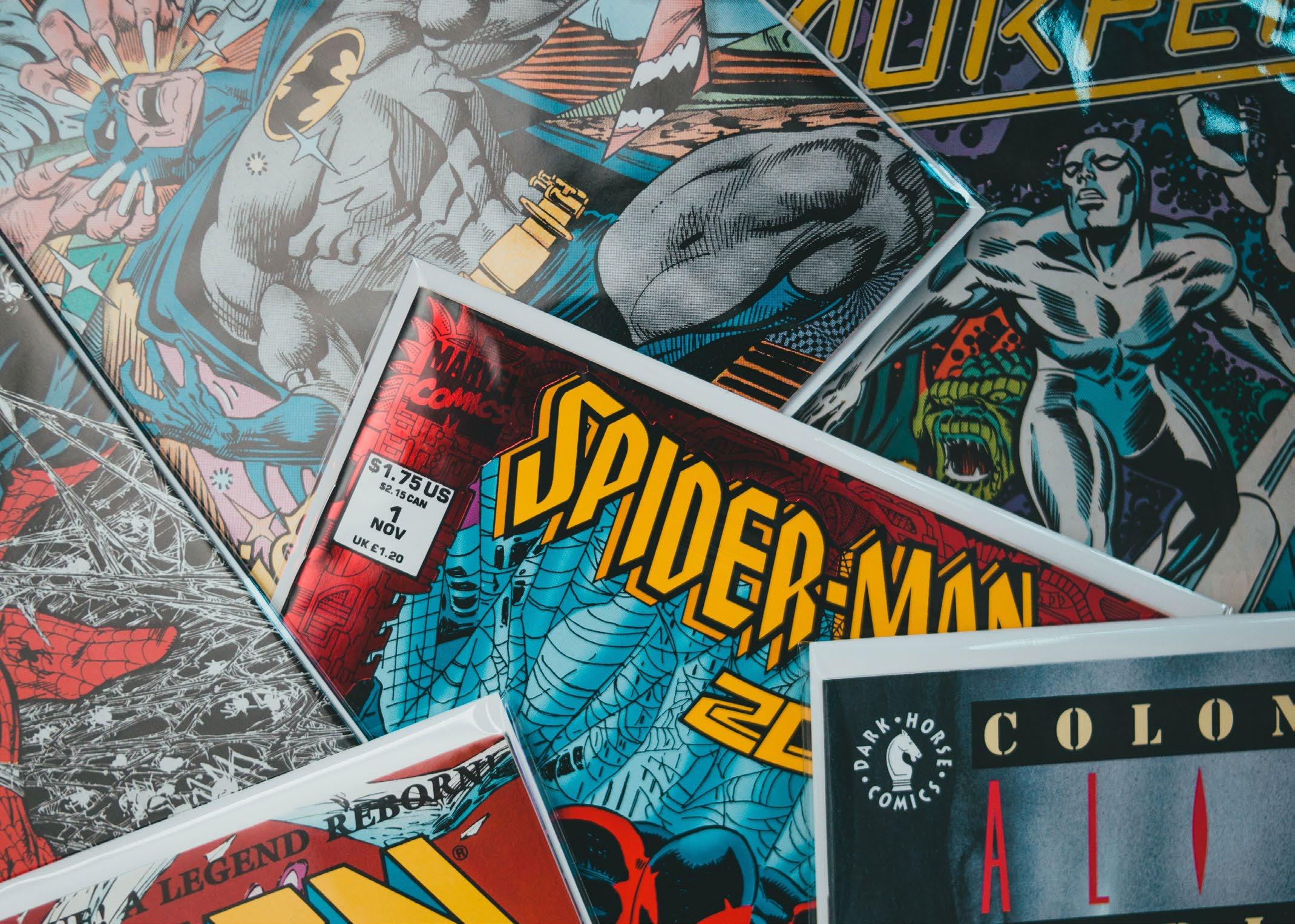
• Doctor Strange in the Multiverse of Madness: 74% | 85%
• Ms. Marvel: 98% | 83%
• Thor: Love and Thunder: 67% | 78%”
According to these, the shows (WandaVision, Falcon and the Winter Soldier, Loki, What if…?, Hawkeye, Moon Knight, and Ms. Marvel) have done much better than most of the movies released in Phase 4. And even though that’s true, many fans aren’t really happy with the shows either. Many people have said that Ms. Marvel had no plot in it and they say it felt irrelevant. When it came to Moon Knight, people were disappointed with the ending because they weren’t satisfied. It seemed like
it made no sense and so much more could have hap pened. Hawkeye and What if…? Had almost no hate from fans, mainly because they were filler shows and they served no pur pose except for being a show for fans to enjoy.
Black Widow and Shang-Chi were very popular movies. Fans could enjoy Black Widow in the comfort of their homes or the theaters when it came out. It was a comical and emotional movie, and the ending was a great cliffhanger that would eventually lead to Hawkeye. Shang-Chi was also a great movie. The comedy was great and so was the action. It was the perfect introduc tion of a new character into the MCU.
Now, Eternals wasn’t popular at all. Characters were inter esting and enjoyable to watch, but the movie on its own wasn’t good. Eternals is only 2 hours and 37 minutes, but it feels much longer. There are too many flashbacks and too much talking. When it comes to the MCU, the actionto-talking ratio is almost always perfectly balanced. In this case, it was very unbalanced. Fans don’t want to see talking in an action movie so it was a terrible origin movie. Doctor Strange in the Multiverse of Madness, as stated earlier, left fans disappointed. They expected more than they received. The cameos were short-lived, and the CGI was questionable at the moment. And then, Thor: Love and Thunder didn’t live up to the classic MCU expecta tions. Some people enjoyed it, but most fans agree that it focused on comedy more than anything else.
While Marvel’s Phase 4 started well, it has not kept up that same energy recently, and fans are not happy. Hope fully, the MCU will turn back around to how it once was, but it doesn’t look that way right now. ■
Hi, my name is Isaiah Roseau. I like reading, writing, and watching almost all genres of entertainment. I’m 15 years old attending 10th grade at Brooke High School.

When it comes to the MCU, the action-totalking ratio is almost always perfectly balanced. In this case, it was very unbalanced.
in my somali household, it's really strict and everyone in my family knows that.
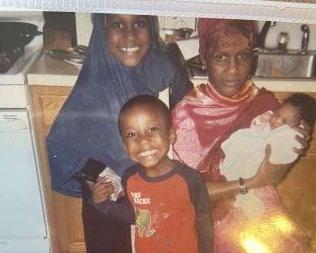
Things like having bad grades and failing are pretty bad, but the pinnacle of this story is not lis tening to your parents.
I used to stay in my room chilling on my small twinsized bed enjoying anime and different videos on my laptop. The fan was on, I was in a big room, it was the best. My Hooyo (mom) always yelled at my siblings and me for not helping her around the house. It's usually messy with clothes, dishes, and random things that I don't know of. I have eight siblings and when we're all in the same house it sounds like a playground. My parents were always working around the house, especially my hooyo She would clean and cook every day with no one helping her. Even though she was doing all this she would still support us.
I remember when I had to spend time in the hos pital, my hooyo insisted on staying overnight with me. The hospital room was spacious and smelled clean, as if they cleaned it every second of the day. The doctors had told me that I had problems with my stomach. It felt as if something was burning there, the feeling was horrible. It made me not eat enough. My hooyo was there because she didn't want her son to stay there alone with no one. I felt sad at the time and had a little bit of a realiza tion. Being in bed with nothing to do with only my hooyo feeding me made a lot of time for us to talk.
We talked about her favorite things and what she wanted. She said her favorite food was basto (pasta) just like me. I guess I am my mother's son. So I told her right when we get out of the hos pital I would learn how to cook basto for her. We both started laughing. I went to sleep and dreamt of how these conversations didn't come when we were at home. I always neglected my hooyo until she had to yell at me to get up. When I fell asleep in the soft hospital bed, the dream I had was vivid. It felt like I could feel it. Being in this vulnerable state where I was able to think about things changed
my perspective on my relationship with my hooyo
This made me realize how much I need my hooyo and how she isn't gonna be here forever to take care of me. I also started to think about how much my hooyo needed help and why I wasn't listening to her. I felt bad for her. I thought I had to learn to become independent. If I learned how to do that then my mom wouldn't have to cook and clean every day for the family.
I woke up and saw a bunch of doctors walk into my room and talk about why I was hospitalized. After the report, the doctors told me I had a chronic illness. When I got that news it was shocking. My heart jumped. I didn't know what that meant but it sounded scary. My hooyo clutched me close as if she was trying to protect me and told me, “Ha ka cabsan wiilkay” — “Don't be scared, my boy.”
It felt serene. My hooyo's warm body comforting me slowed my brain down to let me process all the information the doc tors told me. After all that happened, we finally came home. I was so tired even though I was laying in bed all day. I went to my room and knocked out. I woke up without my mom telling me to do so and got to work around the house. I cleaned everything I could and made food for my other siblings so that my hooyo could not stress about having to do that. She told me, “Ilaah haku barakeeyo wiilkay”
— “May Allah bless you, my son.” I felt so much happiness, I just smiled and didn't say anything. My hooyo just recognizing that I've changed from when I was a lazy kid not doing anything to helping her with everything made me smile. Even when you're down and don't feel like doing anything, just remember that your parents are always there for you. So you should be there for them. ■
Hi, my name is Hussein. I am 16 years old. I like playing basketball and hanging out with my friends. My favorite color is green. I like horses and playing with zombies. I am pretty funny, I think. Some people say that. I enjoy (basto) pasta that my mom makes.

i have a friend that I met online. He was an assistant in math class during online school. At the time that I met him, he was more of a “mentor.” But once I had the chance to have a conversation with him, he was one of the funniest, smartest, and most caring adults I’ve met. He taught me a lot about how energy may affect the way you act in certain situations. All of these interac tions surprised me a lot since I am a big hater of texting and keeping up or meeting people online. I was never fond of texting because it is very stressful, thanks to the awkwardness of not being able to interact with this per son in real life.
It was difficult but we’ve become great friends and influ ences on each other’s lives. This person is Siva, “Dr. Devara.” One of the last times we saw each other we chatted about our future and said our goodbyes like usual: “Be safe, my guy.” Funny enough, this wasn’t the last time we saw each other. A few days later he sur
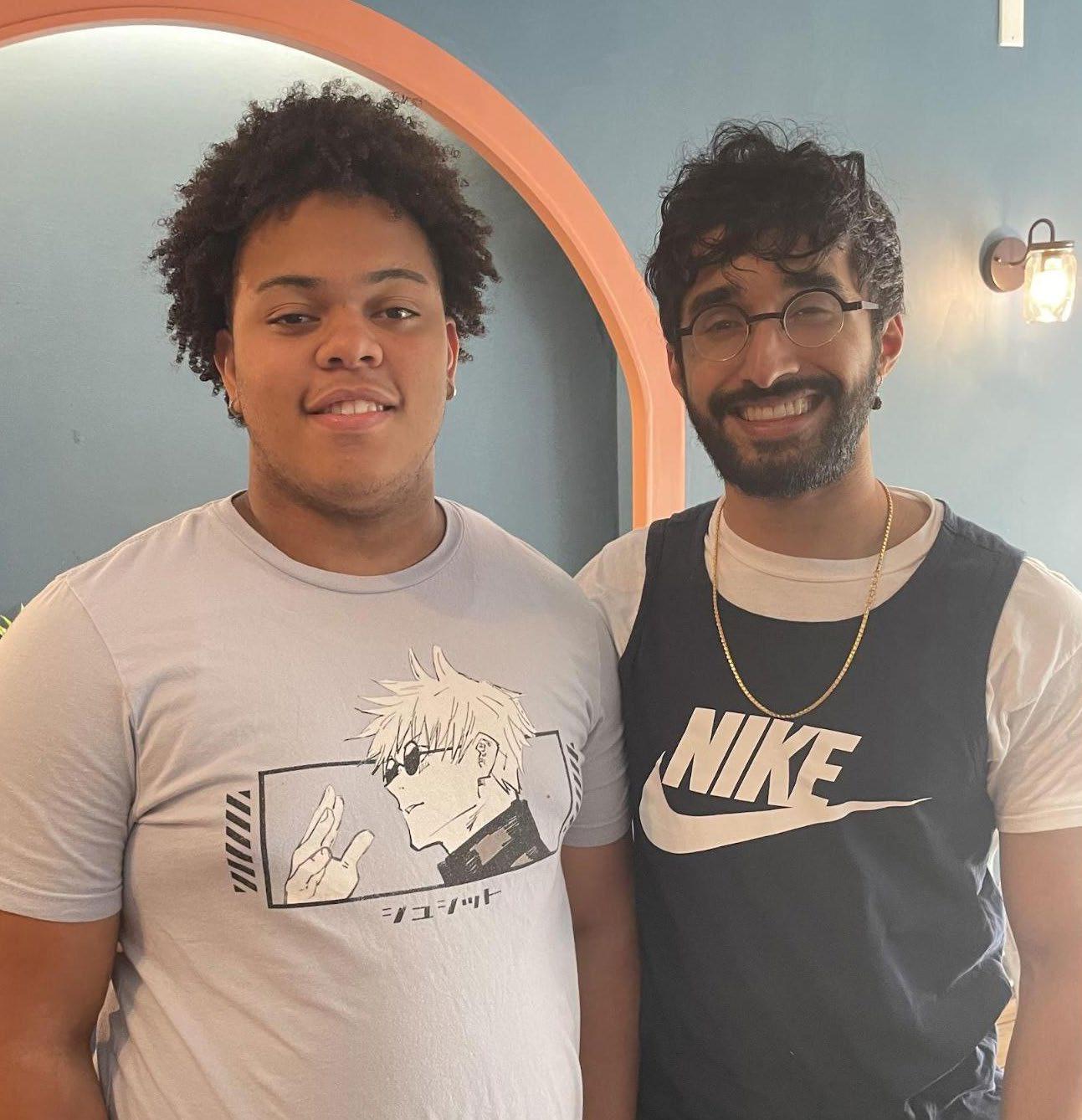
prised me and a lot of the peo ple in the anime club from my school with a shirt with their favorite anime character on it.
We vibed outside of my house for a bit till it was time for good bye. Much wasn’t said — it felt as if we were not going to meet for a long time. We walked two different ways. Although cer tainly not the end, this was the time and place where our paths took different turns.
After this, I went into 11th grade and Siva went to Med ical School. We couldn’t see each other, so texting was the only communication with our busy schedules. It would take us days to respond, but we still were there for each other through things. We would catch up with calls where we would speak about the things we didn’t share over text. We would talk about anime we were watching and even share issues we were facing through that time. We called this time
of our lives “The Training Arc” as we both faced hardships and great opportunities to change ourselves.
During a conversation about anime and life, we had the idea to create a podcast. It was a dream of mine to be able to have a podcast and Siva was willing to help me out, so the “Talk No Jutsu” Podcast was born. The podcast was mainly about anime, and although we only got to record one episode of it, I enjoyed it a lot. The topic of that freestyle epi sode was how to get into anime and what genres we thought would fit certain people based on our experi ence. The conversation highlighted how good of a team we were; we had great chemistry regarding the topic. I was happy to see someone participate in one of my dreams. It made me feel as if someone did care for one of my passions.
A year later, we decided to meet up and grab some lunch. As we were planning I got all the more excited. I was finally going to reunite with one of my mentors. But this mentor had already turned into a friend, one of my closest friends. The feeling of seeing Siva after such a long time was the same as seeing my friends from the
Dominican Republic. It was anxiety-filled yet it brought a great smile to my face.
We set up the date, July 10th of 2022 at 1:00 pm. We had some trouble doing this since we were both working and busy. After all the struggle, the day came around. All day I was imagining what sort of things we would do or talk about. I was anxious about it since this was the first time we would be around each other as “friends” not “student-teacher” any more. I was running around getting myself ready before the time to leave. Then, around 11:59 am I got a text “I’m about to head over, will be at your place around 1. See you soon, my man.” After that, it was about the wait. I didn’t know what to wear and then I remem bered the shirt he gave me, a Gojo shirt. It was light blue matching some shoes I had. Later, around 1:08 pm, I received the mes sage: “Here!”
I called my mom to let her know I was leav ing my house. And then as I stepped outside, there he was. With the same short height, cool glasses, and earrings, right next to the RAV4 2002 he always drove around. Dr. Devara himself: Siva.
After a quick greeting, we hopped in the car and got going. During the ride, we had a conversation about how we were doing, how other students that he also was working with at my school were, and just other things we hadn’t talked about. During this conver sation, I met his girlfriend who already knew me since he mentioned me beforehand. That was surprising — it made me feel as if we had a whole friendship of years and years.
Once we got to the place, we ordered some great Chinese food and boba tea. After get ting the food, we talked about plans after school. He told me a few things about med ical school and how his life was going. We made several jokes about the stuff we talked about.
As all of this was happening, we realized that this was the first time we’d seen each other in over a year. We didn’t notice it because it was such a genuinely relaxed time that it was unbelievable we hadn’t been together since the end of my 10th-grade year. After fin ishing up, we grabbed dessert at Waffles +
Boba Tea in China town, during which we talked about one of our favorite anime. Afterward, we got in the car, and on the way back home we showed each other some of our favorite music and had a little more conversation. Once I got dropped off, we made a pact to see each other at least once every summer. I got out of the car and said goodbye as I went into my house.
This simple interac tion taught me that you don’t need to always be around someone to be able to have a strong connection with them. It’s hard, but respect and love always stay around. I realized that I could have a better relationship with other people that I wasn’t in much contact with. This simple interaction showed me that Dr. Devara and my friendship is some thing I want to keep around.
P.S.. This message is for you, Siva. Thank you for teach ing me how to better myself, and for keeping an eye on me. We may not see each other all the time, but the love and respect are reciprocated from my end to yours. I’ll always be a friend to you, and always find a way to make sure you know that. We’ve had several fun moments and I’ve cherished everything we’ve done together.
Also, HAPPY BIRTHDAY! I hope you enjoy your birthday. And keep growing as the amazing, loving, and mature person you’ve always been. Thank you for being such a great influence and mentor in my life.
I’m Albin, a Dominican 17-year-old journalist at Teens in Print. I have many passions. For example, anime and manga. Those passions have guided me through my writing in TiP.

The feeling of seeing Siva after such a long time was the same as seeing my friends from the Dominican Republic. It was anxiety-filled yet it brought a great smile to my face.
 by matt ouyang
by matt ouyang
the inside of the track was an echoing chasm. A myriad of sounds mixed, rang, shook, and writhed together to create the most terrible of symphonies. The sound of drums rang throughout the stadium, increasing by the next note. Ba-dump, ba-dump, ba-dump, they methodically went. I made my way to my designated lane. A flaring burn erupted from my side. My vision began to narrow. Soles melted into the worn track. Hands met with rubber. Two feet back. Align. Shoulders. Breathe in.
Then the drums were gone. A moment of unexpected peace.
Crack! The starting gun split the air.
And then, just like that, the race was over.
“There is no way I am going to do this ever again,” I remember thinking to myself. The indoor track season had just ended and I was riding home cold and wet on the bus. The season was pretty miserable to say the least. Ironically, the name indoor track is VERY misleading, as we had no indoor track and instead had to go outside in the god-forsaken New England weather. Plagued by the terror that is the Canadian geese, our rag-tag courageous band of students had to venture into treacherous and uncaring terrain. From the very first practice where we did our time trials, I had a nagging injury in my left hip that seemed to never go away. On a rare good day, the temperature outside would reach 40 degrees. There was a fifty percent chance the ground froze when we went to the field. I assumed that every bus driver on the 35, 36, 37, and 38 forgot they had work.
Trying to combine my hobbies outside of school with the increasing work load as well as having track added on top of that was an extreme hassle. 9
hours eventually became 8 which eventually became 7 which eventually became 6. On some days every step to the meeting room after school was slow and full of dread. Combined with the pandemic, all of these factors became extreme.
Yet it was very fun as well. I met some new people, made some new friends, and in general had a great time. I was nowhere good at running, but it was exciting to slowly see how fast you can go up in the limited track meets we did have. Also, I am not the most outdoorsy
person other than the occasional pickup game. Most of the time you’ll find me cooped up inside with some sort of empty bowl next to me. Having more time to go out and interact with others was probably necessary considering how terrible my social skills were and still are after online schooling.
I’ve given up a lot of clubs and other extracurriculars before due to various reasons. I had done fencing for 5 years but stopped due to the diminishing results. Dragged into it by my sister, I had sunken hours of practice into the sport only to quit. Seeing friends of mine who are suc cessfully competing on a national level soon began to weigh on me. I had played piano for 2 years but stopped due to the teacher having to stop teaching over the pan demic. Seeing many of my peers who’ve stuck with their musical instruments for many years really discouraged me. But this only made my will not to quit stronger.
My parents always had high expectations for me, aca demics and athletics alike. In the culture I grew up in, quit ting is frankly frowned upon as when you give up a hobby that you sunk so much time and grueling effort into, it is considered a waste. Especially for the parents who sup port these hobbies by driving and planning for you.
So with the spring track season coming around, I was seri ously doubting whether or not I should continue. It was fun, yes, but were all the hardships worth it? Volleyball try outs are coming up soon, or should I focus on academics for the upcoming term, or should I join some sort of club and try to gain some community service hours? These were all valid options, but choosing any of these seemed like I was quitting something I had enjoyed again. As these thoughts clouded up my days, a few of my close friends mentioned to me that they were considering joining track.
So I decided to join once again. Having friends is unsur prisingly a great form of comfort. I’ve been finding myself having much more fun during practices and meets. Being able to talk with friends put my mind away from how monot onous and boring practices were. Don’t get me wrong, the season was still painful, but having a few friends could make an extreme difference. Instead of dreading the meetings, I was more excited to tell my friends a really bad joke I had made.
Where I stand now, I still suck at running, but I think I’ve gotten a little better at it. Whenever you’re in a rut, having someone to fall back on, motivate, and congratulate you is absolutely necessary. I’ll definitely be doing track next year and definitely with some friends. ■
Hello, my name is Matt Ouyang, he/him, 15 years old, and I am currently attending Boston Latin School. I live in West Roxbury and I love spending my time reading and hanging out with friends and family. One fun fact about me is that I used to do fencing for a long time.
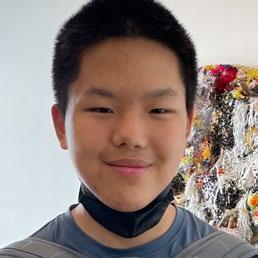
my grandma used to say this all the time, although the phrase may sound very strange to unknowing ears, in my household this was the equivalent of Armageddon. For those who had experienced “it”, this was a common reminder from a Black grand mother that if you don’t act right, ‘I’ll make sure left will be removed from your vocabulary’. One thing about my grandmother was she did not play NUN NADET (nun-na-dat), she was a woman of grace and respect so she wanted her family to be founded on grace and respect. Now nobody really knew what getting their butt peppered meant, except for her children but all we knew was it was no joke. My mom said it was rubbing pepper (not American pepper but African pepper) onto your butt instead of a whipping, but there are a lot of different varieties of what “it” means, every time we asked my grandma she just smiled.
There was a time I recall my brother and I were sliding down the railing and my grandma had told us it was too dangerous. She told us we could hurt our selves but as kids having the time of our lives we continued to slide down. She let us slide for a few and then, “If y’all don’t stop I’m going to put pepper on your butts.”
As kids why would we ever take that seriously, her accent in conjunction with her word choice, to my younger self was probably the most funniest thing I’ve ever heard. So of course I started laughing uncontrollably, and then I fell off the railing, doing exactly what she warned me against, and worse I cried (it takes a true don to admit they cried).
The first thing my grandma said was “AHAA, didn’t I tell you to come from there? Didn’t I tell you it was dangerous?”
All with a lovin’ smile on her face, I looked up and stopped crying. It was as if her smile said “kids will be kids, they’ll learn when they learn, just let them learn”.
She went and sat back at the table in the kitchen and said, “if you don’t learn now, you’ll learn later.”
As a kid I just brushed that off and went right back to sliding down the railing as if I didn’t just bust my behind, she saw me and just shook her head laughing.
An hour or two passed and my brother and I got bored of the railing, we went into the kitchen to get snacks and my grandma was going through the clothing maga zines you get in the mail smiling. Again at the time I thought nothing of it, but she also had pepper by her. With no food I know she was a very strong woman but to eat African pepper just like that is a death wish. Remodeling all in one, I say remodeling because the bathroom will become your new bedroom.
As the curious intellectual I was as a child, I asked why she had the pepper. Now looking back on it we could’ve escaped back into the living room with our snacks, but no — I had to ask the burning question. She looked up smiling and says to me and my brother, “Come here.” Now everyone in the house knows no matter how soft she says “come here,” you better drop whatever you were doing and get there. Immediately like a chemical response, we started thinking of how we didn’t stop going down the railing, and somehow she knew what we were thinking too, she said “You two didn’t listen, so now I’m going to pepper your butts.” Again we didn’t know what this was, all we knew was that it’s not what we wanted. So we instantly started to cry and blame each other, she let this go on for a little then she said “HEY” we froze mid-argument, it was as
if time had stopped, the tears that were rolling down on our faces stopped and stood up at atten tion, awaiting next orders.
We turned to her and she said “you BOTH were playing together, you BOTH didn’t listen, now you know the next time I say not to do it, don’t do it!” The tone was serious as she spoke, then she sent us on our merry way.
I know the story might seem farfetched but that day she taught me and my brother not only respect, but taught me if you were ever in the same boat and had to abandon ship, don’t grab a life jacket and leave your crewmate stranded. I put it into those words but more or less the lesson she taught me was to never abandon someone in order to save your self when you both were in the wrong. She taught me to stick alongside family/friends until the end.
And that’s why this writing piece is named after her lesson. ■
My name is Aajaya. As a 16 year old, I have loved reading and writing ever since I could remember. I even tried writing my own stories when I was younger. I’ve always been big on school and my education. Always pushing to be the smartest and greatest at everything I do, but maybe that’s just the Sagittarius in me.

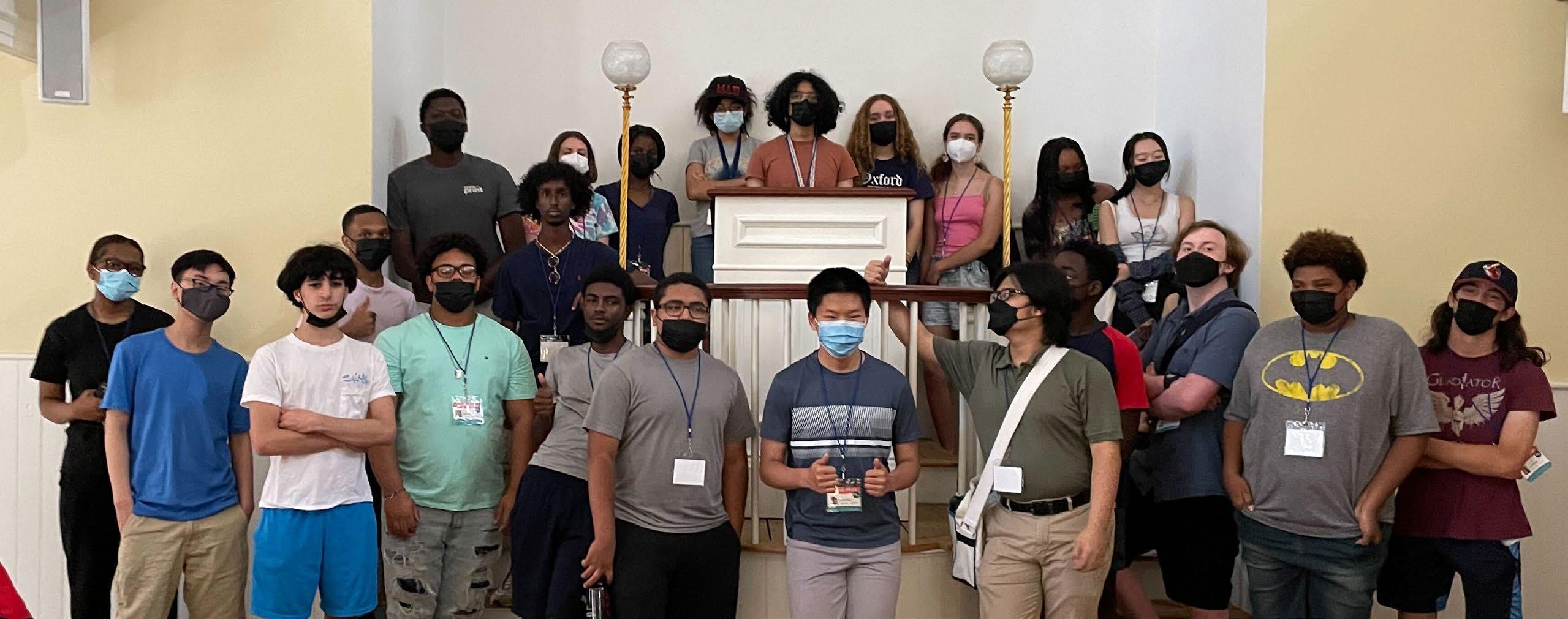
Now looking back on it we could’ve escaped back into the living room with our snacks, but no — I had to ask the burning question.
explode I could bottle it up. I would be determined to make school the least of her worries despite having no care for it, so far I now feel obliged to do work. I would be a class or role model despite just wanting to sleep. I would focus so heavily on school. I had a very small social life which has caused issues with me commu nicating in the simplest of conversations with people. Luckily the school I was at when this problem started to develop this issue, it was the school I had been at since kindergarten. Though these problems would show in later years when I would transfer schools.
Thinking it was my job to take on all the stress of growing up and experiencing change that came with stress, adjusting to a school with a curriculum better than my previous one, and joining a school year that already started with people I never met. Afraid to ask for help from anyone knowing that it would get back to her. These issues were more than just a school issue; it would affect relations with my family with whom I have little bonds in my family, making it hard for there to be someone I can open up to. Especially when you have an emotionally vulnerable parent. While sure they can raise you, the simplest argument will send them spiraling with emotions. To further that issue if you have nobody your age in the family or cousins you grew up with, you end up feeling isolated. And of course, it’s nothing where you feel depressed. Instead, it’s the uncomfortable feeling that things aren’t the same. I have had expe rience talking with more than one person. I have also shared similar experiences meeting these people made me realize how similar to myself that it doesn’t take over your life and if anything is like a scar. A scar can heal and depend on how long the prison sentence affects how deep of a wound it leaves on the family; while the scar can be covered it’s never truly the same whereas the deeper it is the more obvious the damage to the family.
what would change my life and more importantly my perspective of what it means to be a family was when I lost a shoulder to lean on. That person was my father. He was put into prison and took more than just some money with him, enough to make bills a problem again. And in turn, made it so my mom would struggle to pay for a house and take care of me. And being told to be good for her puts you in the mindset that you have to make things easier. Or many who have only a single parent in their lives feel as if they are obliged to take a weight off their parents’ chest by growing up faster or anything to make their job easier, forcing you to think that it’s more of your responsibility than it is theirs to take care of yourself. While for many they made it easier in their ways, for me it was politeness and school, so even if she made me feel like my head was gonna
As time goes on you see how having someone in prison is not just an issue that affects a few people, it’s the whole family after all. They are someone’s kid, sibling, and cousin, which you realize when they switch up when they get to finally talk to them here. They start talking softly and you can tell how it brings them down to see them at such a low point in their life. What hits harder than the prison time is when they just get out of it when they have to adjust to everything and when you think things will be the same back you both realize time has passed and the world around you has kept going on. Eventually, things won’t be the same but will feel more normal but every once in a while it will creep up on me. It’s when my dad forgets I’m in high school. Even now I am reluctant to reach out for help despite my father being back in my life; what’s worse about it is you know that you know they’re going to get out and the idea that everything until then is just a day you have to get through.


belai tossed and turned in the old raggedy blanket; its musty stench masked the smell of leftovers the vil lagers gave him only a few hours ago. Strong winds blew through the window of the decaying cabin, almost trying to break it down. Belai’s eyes shot open. Sweat rolled down his face from his ter rifying dream. He thought about how much time and effort it took to get here and if it was even worth it. “Of course it was,” he whispered to himself. To get from Eritrea to Sudan, all the hiding and sneaking around from the Ethio pian guards, couldn’t have all been for anything.
Belai looked around to see if anyone was awake. A faint sound in the dis tance could be heard but he didn’t think much of it. Belai tried to maneuver through the pitch black room, minding not to hit the sleeping bodies of his 11 bunkmates. The menacing wind began to die down. He stretched his arm out to balance himself. Before he could take his second step Belai felt the ground quaking. Lights flashed through the window blinking on and off. He could now clearly hear the sound of trucks coming closer and closer. Belai stood as still as a deer in headlights, trem bling in his torn clothes.
“So this is it,” he thought. “These 11 gru eling days were for nothing, I knew I should have never done this.” Once, then twice he tried to move but it felt like rocks were piling on his back every time he tried. “BEEP! BEEP!” The trucks seemed to be never-ending, only to get closer. “It’s ok” a hand shot out and latched onto Belai’s ankle. “They can’t hurt us.” With each word the person spoke, chills went down his spine, like a spider crawling down his back. “We are in Sudanese territory, they can’t do any thing to us.” The guide emerged from the darkness.
A weight lifted from Belai’s chest, so fast he felt light head. He felt a warm feeling of relief wash over him, “I made it?” he stuttered. The trucks were long gone, and the first rays of sunshine beamed onto Belai’s face. His smile spread across his lips, ear to ear. A tear trickled down his face, a tear of triumph.
Fifty years later, Belai was able to tell this story to his son, and now I can share this story with those willing to listen. This story that I have admired and stayed glued to for years, consumed my thoughts all too much at some point. What I mean by that is, that my dad had given up quite a lot. He had his family and friends and a noticeable future. But in those eleven days, he came to understand that he might not have those things any more. What I learned from that is, that you need to start from somewhere. No matter what the situation is, you need to begin from where you are at. Of course, other people are going to be ahead of you in whatever situ ation you’re in, but in the end, that doesn’t matter. You need to focus on yourself. I know a majority of people have gone through hard times, times when we are stuck in the past and can’t think of our future. If you want to leave a war-torn country there is a lot you have to do if you can imagine. My dad went through so much and had to persevere through a lot to get to where he is today.
I’m not sure if my dad knows how much his story has impacted me. When I started my first track season there were all different kinds of people. My two buddies and I joined the team. We never really talked about who was faster nor did we care much at the time. The first day was to see how fast everyone was and where they will be placed. Since we were all friends we all went up against each other and started to race. It was a 200meter sprint but it felt like a 400. My first friend took off, and I’ll be honest I’ve never seen him move that fast. After the race, I asked him if he works out when we’re not around and he replied with a simple no. At that moment I decided I had to be faster than this guy. All track season we had this rivalry that only I partici pated in. I had to start somewhere to be faster than him. Even though this guy was faster than me I still believed I could make it happen. To this day I am still trying to be faster than him, and every day I think I’m getting closer to sealing that gap. I just need to work harder.
And for those wondering, Belai now is happily retired in his late 60s. He is in contact with his family who mostly resides in Eritrea (where I’ll be visiting in August). He lives in his home with his son and takes late-night bike rides every so often. When my dad came to America around 1976-1977 he started a new life, built it from the ground up, and molded it into something beautiful. Whenever you feel unmotivated or that things can’t get any worse. Just know you gotta start somewhere, so why not just start now? Don’t put it off until tomorrow. ■
Hi, my name is Yonas Tewolde. I’m 16 years old and I like food a lot. I enjoy playing basketball, running, and swimming. I like writing about interesting stupid topics and intriguing things that are happening in the world.

My name is Ella and I'm a sophomore at Boston Latin Academy. In my free time I like writing, debate, and watching animations. I love education and hope to be a teacher someday.

buzz buzz. My phone, which I always kept on silent, vibrated next to my hand. I opened my eyes and tried my best to sit up under the soft white comforter that had contained me since I’d gotten home from school. I picked up my phone, the device dangling lazily from my hand, and noticed multiple texts from “VIVID;” the group chat I was in with my friends Megan, Jenna, and Sheilin. Scattered between inside jokes and the beau tiful horses Megan sketched were messages spamming my name and questioning my absence from our “Bio for Dummies” meeting on Google Meet. I didn’t realize it then, but those texts helped save my life.
Since 18 months of quarantine had turned all human interactions into nothing but typed out “lol”s and dinner with my mom, I wasn’t starting 9th grade in a great place. I spent each day doing nothing but obsessing over assignments, listening to the same ten Lumineers songs over and over, and playing YouTube commentary videos as I stared at my blank ceiling. Anything that I thought might distract me from the thoughts of self hatred and the desire to stop existing that flooded my mind.
The closest I ever got to this distraction was the calls I had with my friends Megan, Jenna, and Sheilin. We were all in the same biology class and had meetings called “Bio for Dummies” online after school. We intended to study during these meetings, but we rarely did. Instead, we’d laugh over dumb things like the advertised “big print” in Megan’s planner that was smaller than my tiny handwriting. We’d make up stories, like that the curly haired guy in our biology textbook was my identical twin who just happened to be a few hundred years older. We’d talk about how annoying it was that the friend group who sat behind us was talking super loudly about
boys for all of class, only to feel guilty because we real ized our loud complaints about grades were no less annoying and shallow. We’d spend hours with each other, too busy giggling to remember that we were in our all-too-familiar bedrooms with homework and chal lenging socialization waiting for us to end the call.
I hadn’t expected to be in one of these meetings on this particular night. While my friends were planning the gathering in our group chat, I texted them that I was having a “depression Pringles night.” This phrase had become somewhat of an inside joke to us after I’d casually mentioned that I spent a night lying in the dark eating chips and had said, “Your taste changes when you’re depressed” after Jenna judged me for not choosing Lays. Now I always said I was having “depres sion Pringles nights” when I wanted to be vulnerable but didn’t want to force my friends into therapizing me.
I told the group that I would join them if I could, but this was a lie. My plans for the night were to eat chips and lie in bed until I became too tired to hate myself. But when I woke up from depression nap number one and saw my friends begging for me to join them and show them the iconic sadness Pringles, I decided I should at least talk to them for a few minutes. That was one of the best decisions of my life.
At the time this moment didn’t feel like anything. I didn’t spend hours reflecting on how special I felt to see my name in Jenna’s text. I didn’t wake up the next morning filled with gratitude over Sheilin’s laughter at
my depression jokes or Megan’s ability to say random things that let me escape from the despair in my mind. This moment, this laughter, this friendship, it all felt per fectly normal.

But that normality meant everything. For so long, what felt like so much of my life, the only thing that felt normal was lying in the dark, too hollow to feel anything but pain, just trying to make it to the next day while simul taneously hoping that I wouldn’t. To have friends to talk with, to spend time with, to feel happy with, showed me that life, my real, current life, could be beautiful to live.
I’d like to say that this moment cured everything. That the Bio for Dummies group brought me back to humanity and I woke up the next morning full of nothing but love for my friends and a motivation to heal. But that’s not what happened. For a while, my mental health continued to be a struggle of ups and downs with more downs. It wasn’t until months later when I got profes sional help and a Prozac prescription that I started to feel consistently happy and motivated to live fully.
But even though this conversation with my friends wasn’t a miracle cure, it helped. It was a moment out side of suffering. It was a demonstration of happiness. It was proof that people cared about me. It was motiva tion to ask for help, to keep going, to want happiness, so that someday every part of my life could feel as normal, happy, and full as random jokes and conversations with Megan, Jenna, and Sheilin. ■
the anticipation settling into my gut before the first day of school was no unfamiliar feeling. As I began the trek up the crowded Boston Latin School stairs while observing strangers file past me, I assured myself I was surrounded by people who had no idea who I was; this year was my chance for a fresh start. I would no longer play the role of the “shy Asian girl” that was painfully easy to take advantage of. The environment my pre vious school had put me in blessed me with the men tality of either be the bully or be the bullied. I refused to be pushed around (once again), but my moral compass still existed (although maybe my cardinal directions were slightly jumbled); and I knew I didn’t and couldn’t be at the other end of the stick.
As one can imagine, middle-school-me battled the unfortunate and lethal combination of shallow inse curities and social paranoia. For a majority of seventh grade, I remained in denial about how I projected my unhealthy mentality onto my peers. I wasn’t a bully or outright mean, but I was difficult. I was hard to work with and my sense of humor was sometimes ignorant to other people’s feelings. (I promise I was no Regina George though.) I was convinced the only way to earn respect was to radiate a certain aura — or vibe — that inflicted a very, very subtle sense of fear.
When the pandemic hit and all my extracurriculars were put to a halt and school was transferred to Zoom, I had a lot of time on my hands. Some may even say too much time. But this plethora of time offered me the opportu nity to finally do some self reflection — in other words, I psychoanalyzed myself. At first, this deteriorated my mental health. My wake-up call was so abrupt, and I realized, more than anything, I didn’t want to be idol ized, but I wanted to be liked and accepted for who I was. Something I had never experienced previously.
But who am I? I had spent so long suppressing the authenticity of my identity that I felt like I had no sub stance. Had I become…boring?
When everything was forced online, I had a new oppor tunity to reinvent myself and nurture my social life into something I can be proud of. I persisted in main taining friendships and connections with people who meant a lot to me in our brief time in-person and was lucky enough to meet people through mutuals via the
internet. I was gifted the chance to develop a persona that is empathetic, relatable, funny, and most impor tantly, me.
Despite not being able to hang out or even meet anyone in real life to avoid contracting COVID-19, I formed some of the most genuine connections through overcoming my fear of FaceTime and destigmatizing Discord. But I definitely acquired certain spinal issues from spending hours hunched over my computer.
I’ve always tried to be as honest as I can with myself; I like to think that I’m my own biggest humbler — and all of this came down to how self-centered I was.
Through experiencing different types of communities and environments, I figured out that other people do not constantly have it out for me, meaning I don’t and shouldn’t constantly have it out for other people. In reality, no one (that possesses a certain level of maturity) cares enough about you to be your outright enemy.
Being the bully versus the bullied isn’t on a stick, but rather a spec trum. There’s a median because our lives are not cliche coming of age movies where people fight over who wore pink better on Wednesdays. Push against the mentality of “kill or be killed”; don’t be that egocentric — the world does not revolve around an individual.
The teenage era is one where people feel the most vul nerable. Insecurities are maxed out, and it’s like walking on eggshells trying not to embarrass yourself or commit social suicide (if that even exists in reality). Regardless of how difficult it may be, don’t put energy into won dering how others perceive you. I had spent so long fearing the idea of being disliked that I craved validation to an unhealthy point — I thought it could make my exis tence feel justified. I couldn’t have been more wrong: my existence didn’t need to be justified and validation is not synonymous with being liked. Being fake and liked by everyone is exceedingly worse than being true to oneself and only accepted by a few. Believe me, the ones who think middle school is heaven on earth are the ones who peak as teens. ■
I’m Michelle Wang, currently a rising tenth grader at Boston Latin School. My passions include journalism, meeting new people, and listening to music! And I dress like I lost a fist fight with Ed Hardy circa 2007.

I was gifted the chance to develop a persona that is empathetic, relatable, funny, and most importantly, me.

